Escalation of protests against Robert Mugabe in Zimbabwe before the coup d'etat.
Robert Mugabe’s Zimbabwe at boiling point as povo rise in anger.
An oppressive regime can suppress its people for only so long, before - with nothing more to lose - the “povo” rise in anger and desperation.
Robert Mugabe had been installed as ruler by the British in 1980 after the February elections. He replaced the Zimbabwe Rhodesia government of Bishop Muzorewa from the ZANU-Ndonga faction who had won the democratic elections in Rhodesia in January 1979 when Ian Smith relinquished power. Mugabe became Prime Minister and seven years later took over the role of President but dissent grew amongst the people as economic conditions progressively deteriorated. It became apparent that change could not be achieved through the ballot box so desperate lone activists stepped up. As the momentum started to pick up and the media started to report events, events were documented and presented in this record:
At first, the demonstrations in Zimbabwe were peaceful; ignoring the odd savage beating or two by police. 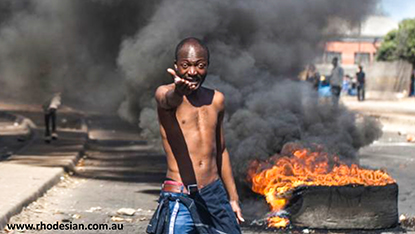 Then people just disappeared. When the names Itai and Tonderai are mentioned, Zimbabweans nod with miserable resignation.
Then people just disappeared. When the names Itai and Tonderai are mentioned, Zimbabweans nod with miserable resignation.
Out of nowhere Pastor Evan Mawarire launched the #thisflag movement by posting a video on Facebook on 22nd April 2016. He said that “enough is enough” and it went viral within hours. He labelled 6th July a day of civil disobedience. One of the slogans among many was “burn Zimbabwe burn”.
Photographs of a policeman manacled by his own handcuffs and a video of police with their dogs running for their lives to the jubilant cheers of demonstrators were shared.
In London, a crowd that was demanding that the British government should reject the Mugabe regime laid siege to visiting Zimbabwean Finance Minister Patrick Chinamasa at Westminster’s Chatham House. He needed to be rescued by British police.
This warning was given: "Unless things are managed with care, Zimbabwe is on the brink of civil war."
How did it come to this?
Thirty-six years of rigged elections, the deliberate starvation of those who did not support Robert Mugabe’s Zanu PF, absolute media control and then the final coup de grâce followed on from the destruction of the jewel of Africa in 2000 by the takeover of productive farms that has led to unemployment of 96 per cent. Most people survived by selling whatever they could at informal wayside stalls.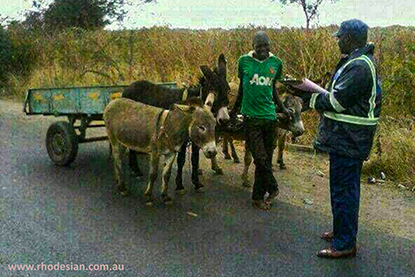
This combined with looting of the diamond fields by Mugabe’s cronies, the President’s regrettable report that his regime had “lost” $US15 billion, the banks running out of cash and delayed or non-existent salaries to the civil service and teachers has left the landscape ripe for revolt.
Two specific events garnished support for the civil disobedience that took place on the 6th July, 2016.
First, the increasing number of road blocks, sometimes every few kilometres, manned by police extorting “fines” for arbitrary infringements such as a “messy” windscreen wiper. Young mini-bus drivers had secured a source of slim revenue: picking up random passengers on the roadside. The continuous road blocks have made this service impossible.
Second, the government passed legislation two weeks before banning the informal importation of goods. Zimbabweans, largely women, had crossed the border into South Africa for years buying bargain-priced foodstuffs and other necessities before returning to sell them wherever they could.
It was written that Mr Chinamasa would very likely come home from Europe with his begging bowl empty. "So Zimbabweans will have no hope of getting enough to eat and, as more than 200 businesses have closed down this quarter, no hope of work.
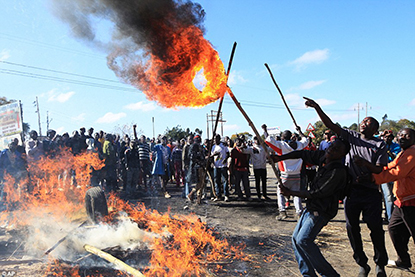 "The demonstrators are essentially seeking a peaceful solution, but the bottom line is they want Mugabe and ZANU-PF out as soon as possible. With the unpredictable nature of demonstrators once they’re really angry, despite the huge arsenal of anti-riot machinery Mugabe has built up for just such an eventuality, there are worrying times ahead.
"The demonstrators are essentially seeking a peaceful solution, but the bottom line is they want Mugabe and ZANU-PF out as soon as possible. With the unpredictable nature of demonstrators once they’re really angry, despite the huge arsenal of anti-riot machinery Mugabe has built up for just such an eventuality, there are worrying times ahead.
"We can only pray this will not turn into a genocide similar to the 20,000 Matebele murdered in the Gukurahundi (Shona for “the early rain which washes away the chaff before the spring rains”) of 1983-87. Mugabe tried to recruit the veterans of the Bush War that led to independence in 1980, his willing enablers in the seizure of white farms, but they have now endorsed the protesters.
"Will Mugabe take any notice of his people? Who will replace him? He has made sure the succession plan is as muddied as it could possibly be. It can only be hoped the international community, for years all too aware of what has been happening, will be there to help pick up the pieces and restore stable government to this once glorious country."
Itai Dazamara and the missing activists
Open dissent in Zimbabwe started to gain momentum in 2016 and was buoyed by real time posts on social media. Two activists were mentioned in the early stages as their legacies provided inspiration and they are referred to as ‘Itai’ and ‘Tondarai’.
Itai Dzamara, journalist-turned-democracy campaigner, was abducted in broad daylight in 2015. It is alleged that five men dragged him into an unmarked car. His wife approached 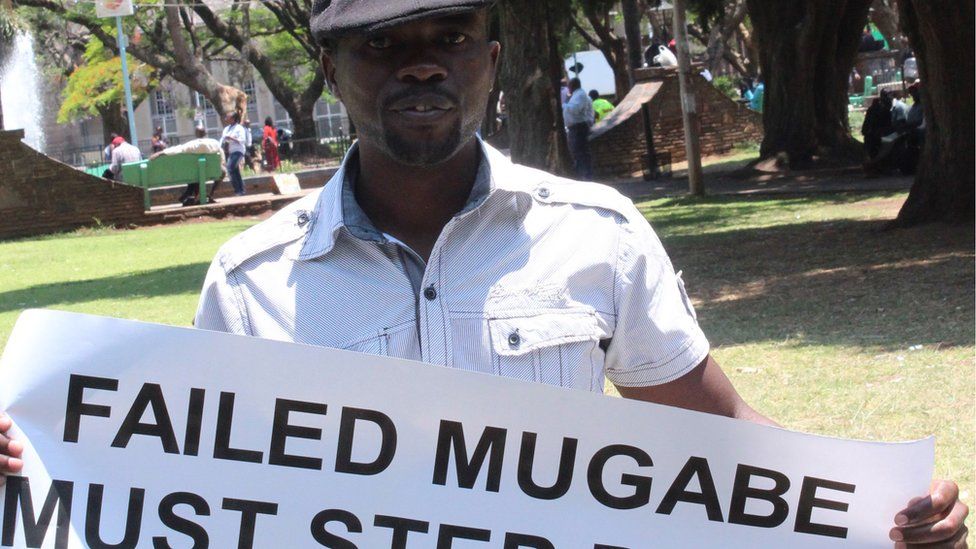 the High Court in a bid to force the police and the Central Intelligence Organisation (CIO) to search for her husband but failed. His younger brother, Dr Paston Dzamara, continues defiantly.
the High Court in a bid to force the police and the Central Intelligence Organisation (CIO) to search for her husband but failed. His younger brother, Dr Paston Dzamara, continues defiantly.
Mr Dzamara began his one-man protest movement in 2014 - that was an incredibly dangerous goal. Political dissenters often paid a price. But day after day, Mr Dzamara returned to sit in Africa Unity Square, a tree-filled park in the centre of Harare, holding his sign: "Failed Mugabe must step down." Soon others began to join him. Dirk Frey, who first read about it online, recalls the cat-and-mouse games they would play with the police during their colourful, whistling lunchtime protests. "It was like we were playing a game of chess against the authorities. We'd occupy the park and then they'd come chase us out and we'd run into the alleys surrounding the park and then come back.” These small acts of defiance came at a price. Mr Dzamara landed up in hospital several times after being beaten by police.
Then, on 17th October 2014, he took his protest a step further. He and two other protesters, Tichaona Danho and Philosophy Nyapfumbi, hand-delivered a petition to Mr Mugabe's office asking him to step down. They were interrogated for eight hours and beaten. The move certainly got the attention of the wider public. After the petition was delivered, a newspaper columnist asked: "Is Itai Dzamara the dreamer we lack?"
Less than six months later, he disappeared. Itai was abducted on 9th March 2015 when he was at his barbers’ shop in Harare’s Glen View suburb. He was in the barber chair getting his beard trimmed when they noticed a white Nissan twin cab which seemed to be circling the block. It looked out of place - but Mr Dzamara was confident he knew who it was.
"Ndeye vakomana," Itai said - a Shona phrase meaning "it belongs to the boys". The boys being Zimbabwe's secret police.
Minutes later, two men dressed in plain clothes came in and asked for airtime for their mobile phones. When the barber said they did not have any, the men said they were actually after a cattle thief - Mr Dzamara. The activist was handcuffed and bundled into the back of the car. The white car then sped off. In total, five men were involved in the abduction of Mr Dzamara. He has not been seen since.
The history of enforced disappearances in Zimbabwe goes back:
Army Captain Edwin Nleya disappeared in Hwange in 1989 while investigating the involvement of senior officials in ivory poaching and his body was only found two months later.
CIO secretary Rashiwe Guzha disappeared after breaking up an affair with Deputy Director Edwin Shinhuru in 1990 and has not been found.
MDC activist Patrick Nabanjama was abducted in the 2000 election and never found.
Human rights activist Jestina Mukoko was abducted from her home in 2008 and appeared in a police station days later and spent three months in detention then was cleared of the charges the following year.
Tondarai Ndira, ex newsreader and head of the human rights group, Zimbabwe Peace Project, allegedly had to be identified by DNA in 2008 after his body was located a month after an abduction at the height of Zimbabwe's bloodiest election campaign.
Prominent human rights activist Paul Chizuze was last seen on 8th February 2012
Zimbabwe activist Evan Mawarire is freed
Hundreds of citizens who had mounted a 12-hour vigil at the Harare magistrate's court on 13th July 2016 erupted into song and dance, honking vehicles and flying the Zimbabwean flag.
The scene resembled independence celebrations or a parade of a hero who had just returned from exile as a crowd of nearly a thousand people sang, danced, prayed and shared solidarity messages.
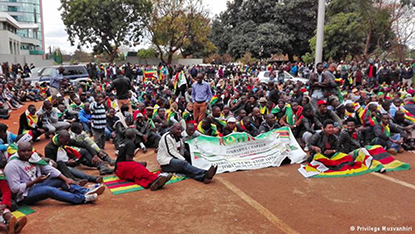 Citizens from across the racial divide, and with diverse political, religious and social beliefs gathered at the Harare magistrate court in show of support for Evan Mawarire's citizen activism.
Citizens from across the racial divide, and with diverse political, religious and social beliefs gathered at the Harare magistrate court in show of support for Evan Mawarire's citizen activism.
About 100 lawyers from the Zimbabwe Lawyers for Human Rights group were at the court to offer legal assistance.
The public gallery at the court was packed to the brim and police maintained a heavy presence in and around the courthouse.
Observers said the turnout of citizens to the courts was a clear message to the state that what Evan is advocating for are issues affecting Zimbabweans from all walks of life.
All charges against "This Flag" movement leader Mawarire have been dropped.
One of the citizens present at Wednesday's court vigil, 49-year-old Claudia Mutasa told DW that authorities are failing to understand that Evan is not a politician who wants to form a government.
“Pastor Evan is not coming from a political standpoint. There is no denial that things are not well in the country. Arresting Evan is not fair. Government is violating fundamentals of democracy,” Mutasa said.
Musician Willis Wataffi said it was high time that the government stop shifting the blame and pointing fingers at western forces who it always accuses of plotting to effect regime change.
“We are here not for a man, but for a cause. I am affected as an artist. If the ordinary citizen does not have money to spend, I am affected. They will not come to our shows,” Willis said.
Evan Mawarire was initially arrested on public violence charges Tuesday before the state changed the charges to subversion and unseating a constitutional government in court on Wednesday.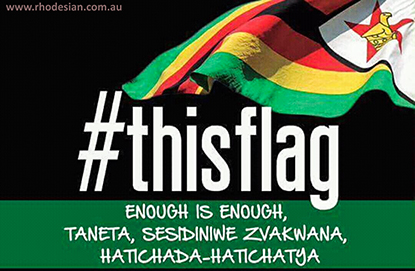
Had the treason charge stuck, he could have faced up to 20 years in prison.
Mawarire has been calling the Zimbabwe government to deal with corruption, injustices and abuse of state funds since April.
Mawarire supporters rejoiced upon hearing news he would not face charges.
No case to answer!
The sitting magistrate Vakai Chikwekwe could not approve it and dismissed the case on procedural inconsistencies.
Changing or placing a new charge on an accused person in a court session is not permissible under the Zimbabwe constitution.
Speaking to DW after the release of Evan, the legal counsellor Dzimbahwe Chimbga from the Zimbabwe Lawyers for Human Rights, said the judgment was a restoration of the law to protect citizens.
“We agree with the magistrate's ruling. It is consistent with the provisions of the Zimbabwe constitution. People have the freedom to express themselves,” Chimbga said.
Evan Mawarire attracted the wrath of the state after mobilizing last week's protests that closed down businesses and schools across the country.
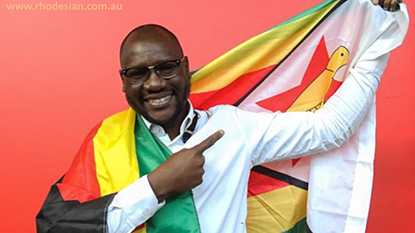 Last week's protests by public transport operators also fueled nationwide demonstrations. Taxi operators accused police officers of using roadblocks to extort money from motorists.
Last week's protests by public transport operators also fueled nationwide demonstrations. Taxi operators accused police officers of using roadblocks to extort money from motorists.
After emerging from the court, Mawarire addressed the crowd and thanked them for being united.
He remains defiant and says citizens must keep the momentum to press President Mugabe's government to address socio-economic issues that are affecting the country.
“We are not backing down anymore. This is our chance to speak to our government, and we won't get robbed of that chance,” Evan said.
“We have not broken any laws. The government intimidates us, they arrest us, and they scare us into keeping quiet and we are saying we are done with that. If you touch one of us, you are touching all of us.”
Growing disgruntlement is sweeping across the country with various groups expressing themselves against government policies.
Some have called it the era of hashtags that has seen Zimbabweans speaking out in an exceptional way.
War veterans remain defiant
War veterans have thrown down the gauntlet at President Robert Mugabe and Zanu PF, scoffing at the government’s savage crackdown on their leadership which they say is akin to what the late Rhodesian prime minister Ian Smith and his minority government did to blacks before Zimbabwe’s independence.
The restless freedom fighters’ defiance comes as their secretary-general, Victor Matemadanda, as well as three other officials, were given bail yesterday after being charged on Monday with undermining and insulting Mugabe.
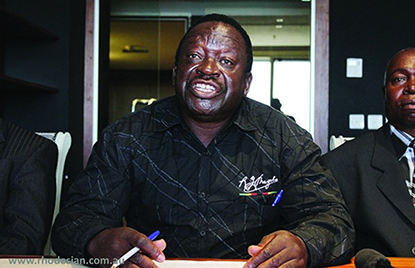 To date, police have all in all arrested five senior war veterans, including the spokesperson of the Zimbabwe National Liberation War Veterans Association (ZNLWVA), Douglas Mahiya, in a crackdown which came in the aftermath of the freedom fighters serving divorce papers on Mugabe in a stunning development two weeks ago.
To date, police have all in all arrested five senior war veterans, including the spokesperson of the Zimbabwe National Liberation War Veterans Association (ZNLWVA), Douglas Mahiya, in a crackdown which came in the aftermath of the freedom fighters serving divorce papers on Mugabe in a stunning development two weeks ago.
“It is sad that these fighters, the best that Africa has ever produced in modern times, four decades down the line they are being persecuted by those who were war deserters, war cowards,” ZNLWVA chairperson Christopher Mutsvangwa told an online television channel this week.
“It is an attempt at intimidating us but if Smith couldn’t intimidate us then no one will intimidate us. It is very sad that these people abuse the most powerful office in the land … a whole rally of pseudo war veterans is called up to be addressed,” Mutsvangwa added, also criticising last week’s gathering in Harare of Zanu PF supporters to ostensibly show solidarity with Mugabe.
Characteristically shooting from the hip, Mutsvangwa said there was an attempt by those in power to “politicise the criminal laws of this country” in a desperate endeavour to silence war veterans.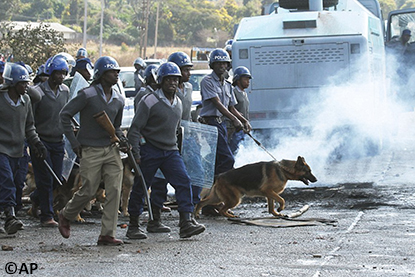
“Arrests and any other attempts to derail us is a useless thing. We want the nation to know that we are behind the leadership of Mutsvangwa. Any other moves are just as good as what Smith did when we were in the struggle,” Mahiya told the Daily News yesterday.
“Smith wanted to rope in Africans and set up a puppet government which was led by Muzorewa. In this case, there is going to be a puppet war veterans' leadership that is not a true representative of the people because it is not elected by the people under the constitution of the war veterans. So, their operations are illegal,” he added.
Analysts also said yesterday that the war veterans had at last found their voices despite the crackdown, and this was indicative of their resolve to take on Mugabe and the rest of the Zanu PF leadership despite the government’s vicious response to their communiqué last week.
Speaking in Harare during his hastily-convened meeting with Zanu PF supporters last week, Mugabe said the former freedom fighters who had denounced him would be punished severely, in similar fashion to the punishment that was meted out to delinquent war veterans who were thrown into dungeons during the country’s liberation struggle.
Political analysts also said the government had miscalculated the mood among both the war veterans and the general populace when it decided to descend heavily on the ex-combatants.
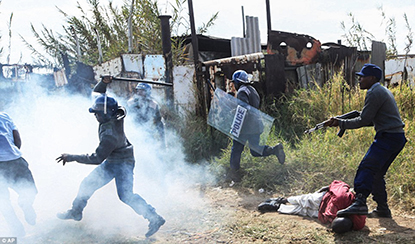 “The statement by the war veterans’ chairperson Mutsvangwa puts down the gauntlet and it will be interesting to see how the regime responds to that.
“The statement by the war veterans’ chairperson Mutsvangwa puts down the gauntlet and it will be interesting to see how the regime responds to that.
“Clearly, where they expected the war veterans to scurry and cower, they have not. However, it is unlikely that the establishment will take this lying down. So, an escalation of sorts is likely and the war veterans and the country need to brace for that,” said civic leader and political analyst McDonald Lewanika.
Another analyst Maxwell Saungweme said the war veterans were clearly fed up with Mugabe and his government.
“Those handing over themselves to authorities are just telling the regime that we have had enough. Indeed, they cannot arrest all of us. We have to defy this regime that is leaving the affairs of the country on auto pilot,” he said.
War veterans have been one of Mugabe and Zanu PF’s strongest pillars of support over the past five decades, playing particularly significant roles to keep the nonagenarian in power in the hotly-disputed 2000 and 2008 elections which were both marred by serious violence and the murder of hundreds of opposition supporters.
The fall-out between Mugabe and the war veterans also comes as the 92-year-old is battling swelling public anger against him and Zanu PF, which has seen strikes and riots hurting the already dying economy further.
Yesterday, unemployed college and university graduates and pro-democracy groups held successful demonstrations against Zimbabwe’s untenably high unemployment and the government’s plans to introduce bond notes.
In the meantime, Mahiya also said yesterday that he was unfazed by the crackdown on war veterans as the meeting that produced the communiqué that authorities took exception to was attended by provincial and district leaders of ex-combatants who wanted to discuss problems besetting the country.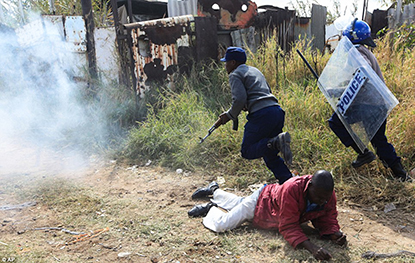
“We were arrested because of the meeting that we had at Raylton Sports Club where we met with district and provincial officials. It was a follow-up to the meeting we had with the president where we gave him our grievances and the problems that people are faced with.
“We thought that they could respond to that but they did not, and so we called the leadership to map a way forward and that is what we were discussing at the meeting,” Mahiya said.
Elaborating on his arrest, Mahiya — who was held at the infamous Matapi cells in the Harare high density suburb of Mbare which have been condemned by the country’s courts — said the place is “a hellhole that is unsuitable for human beings”.
“That place is so bad so much that you cannot put an animal there. There is complete darkness and the blankets are lice-infested. The blankets are those that are used to cover the dead. The toilets are so bad,” he said.
Protests rock Harare
More protests are taking place in Harare today on 3rd August 2016 with hundreds marching in the central business district over the failure of President Robert Mugabe’s regime to provide the 2,2 million jobs it promised at the last election.
The marchers are also resisting the pending introduction of bond notes in Zimbabwe.
There is a heavy deployment of anti-riot police in the city centre.
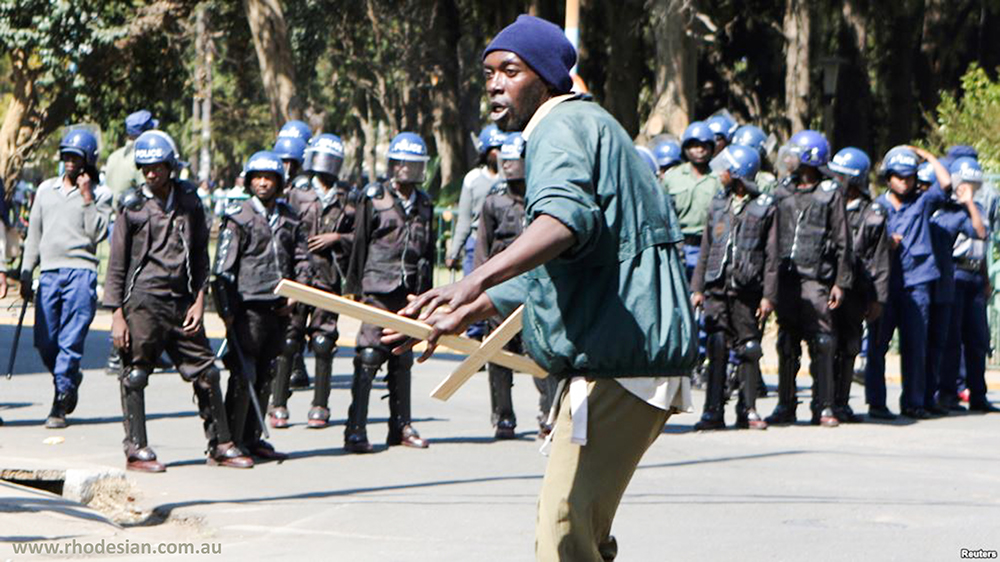 Remember this protest only went ahead after the intervention of the courts following attempts by the regime to ban it.
Remember this protest only went ahead after the intervention of the courts following attempts by the regime to ban it.
Tajamuka/Sesjikile member, Slyvanos Mudzvova, said “You can’t pick up a bond paper and print it and put it on the same value with the US dollar. That is why I am saying on August 3, let’s meet at corner Julius Nyerere and Jason Moyo and march to the ministry of Finance and tell Patrick Chinamasa’s office that we reject his bond tissues.
“He must use them himself in the toilet. To you retailers, have you forgotten that your shops were once left empty and you had no business to do, while vendors could not buy staff to sell and commuter omnibus conductors and drivers had nothing to show for their daily works as the bearer cheques we were using had become worthless?
On this day greatness was born
Today, I would love for you to join me in celebrating the life of a contemporary hero, Itai Dzamara.
On this day Itai Peace Kadiki Dzamara was born.
I spent the last couple of hours in the Itai Dzamara Square (Africa Unity Square) praying and reminiscing about our childhood and how time has processed us to where we are. My mind travelled far and wide and I can only thank God for allowing me to share the same womb and life with this level of greatness.
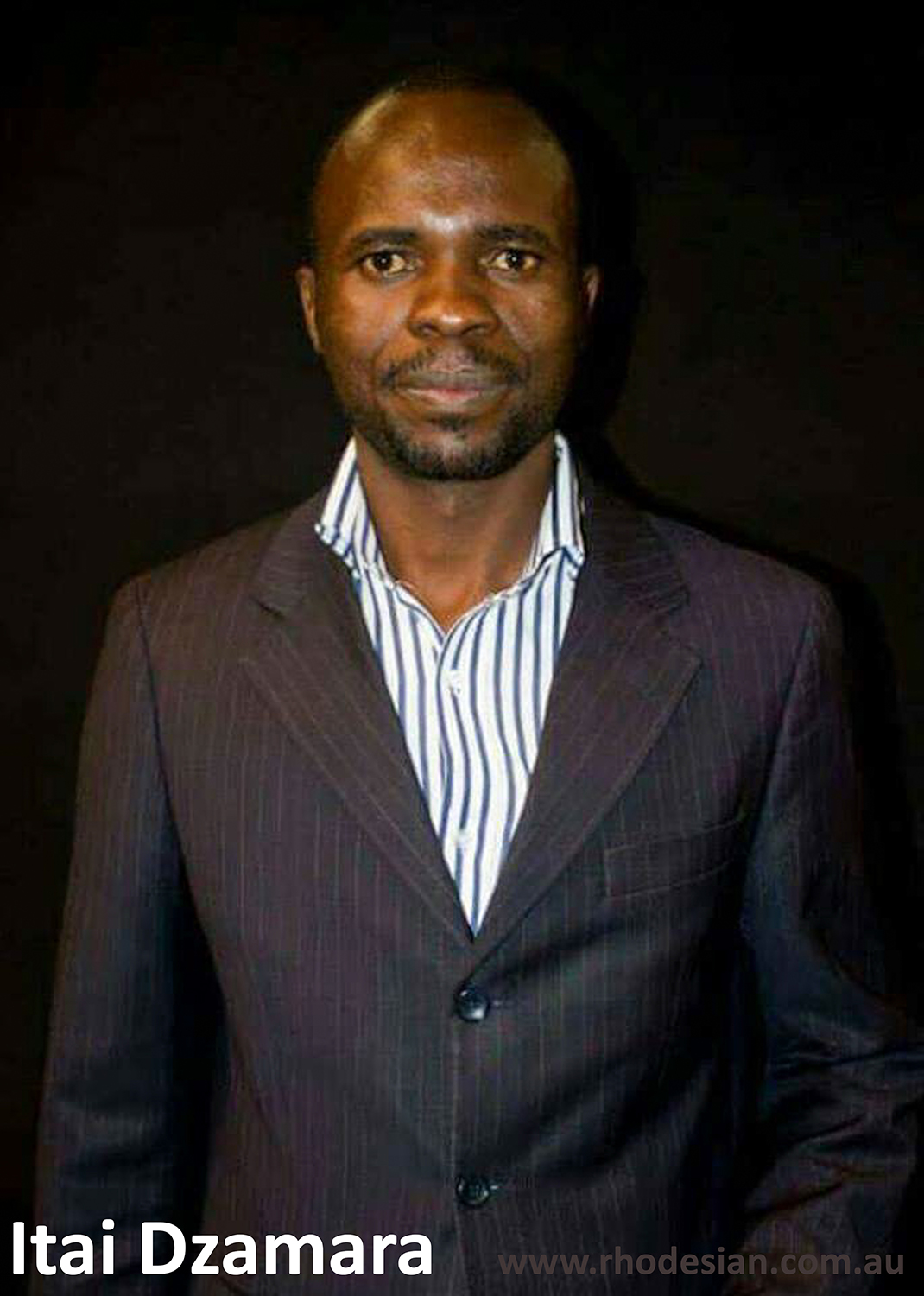 Whatever they did to Itai, we choose to celebrate his life even though a lot of unanswered questions and anger engulf our minds. We thank God for Itai's life and what He has allowed him to accomplish.
Whatever they did to Itai, we choose to celebrate his life even though a lot of unanswered questions and anger engulf our minds. We thank God for Itai's life and what He has allowed him to accomplish.
The history of Zimbabwe will never be complete without Itai's name. He inscribed an indelible footprint on the sand of this great nation. He laid a foundation for the new Zimbabwe we are all yearning for.
Itai blazed a trail and ushered in a new dispensation of citizens' activism and participation. We salute him for that. A quintessential hero, he is.
As we celebrate his life, we make a commitment to finish what he started and we hope he will also greet the new Zimbabwe he sacrificed for.
Ladies and gentlemen, help me celebrate this gift in time.
Happy birthday Itai.
#BBID #TheEndgame #Occupy
Dr Patson Dzamara, 7th August, 2016
Police break up "Mega-demonstration" in defiance of Court order
A court-approved protest staged by Zimbabwe's opposition supporters seeking electoral reforms turned violent Friday, 26th August 206 in Harare when it was broken up by police.
In Zimbabwe's capital city, police fired tear gas and water cannons to disperse a demonstration that the country's top court had ruled could proceed.
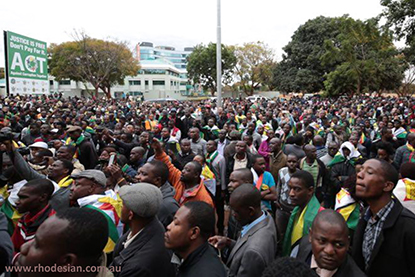 Opposition leaders termed Friday's march in Harare a "mega-demonstration." It marked "the first time that Zimbabwe's fractured opposition joined in a single action to confront President Robert Mugabe's government since 2007," as The Associated Press reports.
Opposition leaders termed Friday's march in Harare a "mega-demonstration." It marked "the first time that Zimbabwe's fractured opposition joined in a single action to confront President Robert Mugabe's government since 2007," as The Associated Press reports.
Former Vice President Joice Mujuru, who is now at odds with Mugabe, told reporters that 50 people were injured and admitted to hospital. And Didymus Mutasa, a senior official from Mujuru's party, told Reuters, "Today has been for me the worst day that I have lived in this country, where I have observed with my own eyes, the state breaking its own laws and the state starting violence by attacking people who were just gathered together."
The protest was organized by at least 18 opposition parties, as the BBC reports, and demonstrators were "calling for electoral reform ahead of polls in 2018." Mugabe has ruled the country since 1980 and plans to run again.
"Clashes spread through the streets of the capital Harare as riot police fought running battles with protesters who hurled rocks at officers, set tyres ablaze and burned a popular market to the ground," according to Reuters.
"I was beaten by the police here exercising my constitutional right, beaten with baton sticks by a horde of around 10 police officers," Jonathan Malindati told The New York Times. He was "bleeding from his head and displaying baton marks on his back," according to the newspaper.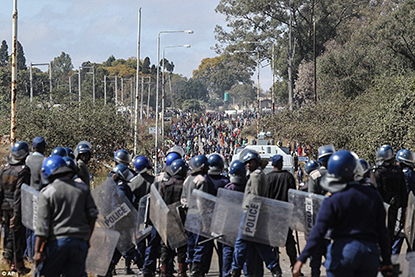
Ahead of today's demonstration, police had "warned that unauthorized demonstrations would not be tolerated," NPR's Ofeibea Quist-Arcton tells our Newscast unit. "Public protests were a rare occurrence in Zimbabwe, but there have been a spate of demonstrations in recent months demanding that President Mugabe stands down over economic mismanagement, non-payment of salaries and a chronic shortage of cash."
A woman carrying groceries on her head runs away as Zimbabwe's opposition supporters set up a burning barricade.
As NPR has reported, Zimbabwean clergyman Evan Mawarire has been at the centre of many of those recent protests. He set off a wave of strikes and demonstrations when he appeared on YouTube draped in a flag, calling for change. "This flag, every day that it flies, is begging for you to get involved, to say something, to cry out and say, 'Why must we be in this situation?’" he said in the video, which sparked a movement called #ThisFlag.
Mawarire was arrested for inciting violence, and fled the country after his release. Speaking on ‘Weekend All Things Considered’, he described a sense of growing momentum to the protest movement:
"It was amazing to see and so humbling to see Zimbabweans come to a place where they were bold enough to say to a government that is known to be harsh, 'Enough is enough and we won't let you treat citizens the way that you are treating them.' That added to the momentum of the citizens' movement that we now have on our hands."
The leaders behind Friday's demonstration have vowed to continue taking to the streets.
"If that was intended to cow us from demonstrating, I want to say the opposite has been the case. We are going next Friday to do exactly the same as we have done today," Mutasa said, according to Reuters.
Precipice
Yesterday was a bizarre experience. In the morning I planned to take part in a march that was due to be led by 18 political parties to the Headquarters of the Zimbabwe Electoral Commission where a petition on electoral reform was to be handed over. All previous MDC marches had been peaceful, happy events, virtually no Police presence and not a hint of violence or trouble.
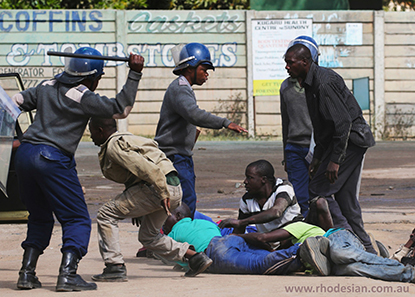 Well before I got to the rallying point, I saw people running and vehicles turning around and going back the way they had come. This was two hours before the event was due to start. When I got to about a kilometre from the point we were meant to start from, I saw the first tear gas and water cannons.
Well before I got to the rallying point, I saw people running and vehicles turning around and going back the way they had come. This was two hours before the event was due to start. When I got to about a kilometre from the point we were meant to start from, I saw the first tear gas and water cannons.
I saw a group of young people looking down the road and stopped to ask what was happening. They said “we got clearance from the Courts to march and were going to Freedom Square (Zanu PF calls it Robert Mugabe Square) when we were tear gassed by the Police”. They advised me it was dangerous to go any further. I proceeded to the collection point through rock strewn roads, burning tyres and saw running battles between young people and the Police. I saw water cannons in action with blue dye in the water and one machine putting out a fire.
The main road through the City was totally deserted, the Agricultural Show grounds, normally packed with visitors and opened officially the previous day by the Vice President of Sierra Leone, was also abandoned – not a vehicle in sight, the only people were the Police and the small running groups of protestors. There was drifting clouds of tear gas and smoke everywhere.
I left the area and drove to Parliament to wash my face and get the tear gas out of my eyes. Then I tried to go back but was completely blocked by cars fleeing the battles in the CBD. Subsequently the street battles raged over much of the City, business closed down and the streets deserted. The army was deployed and helicopters were put up to monitor the people.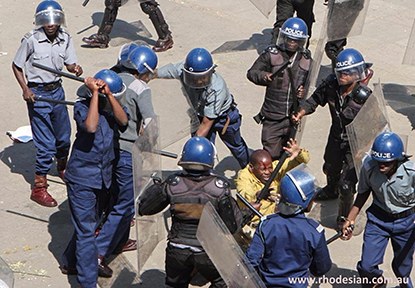
Was there any need for this? Absolutely not! I had participated in four previous marches and had not felt for one instance, any threat or danger. Just cheerful thousands celebrating their right to protest the state of crisis through which we are all living. The violence was instigated by the Police who were totally responsible for what followed. I had previously warned colleagues in Parliament that the tension on the streets was palpable and that everyone needed to be careful when handling any protests.
The previous Wednesday, a tiny demonstration by 200 MDC Youth in the CBD had also been attacked by the Police – perhaps more justified because they were defying a decision to turn down their request to demonstrate. But what then happened should have taught the authorities a lesson – the general population joined in and mayhem reined for the next 4 hours eventually shutting down the whole City. Cars were burned, shops looted and a great deal of damage was done.
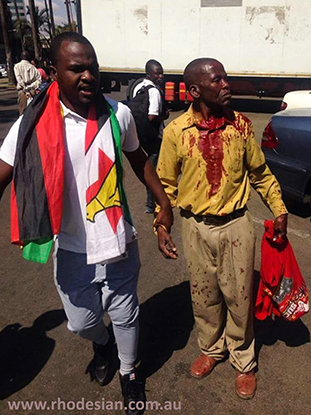 Yesterday, I drove away from the mayhem in the CBD and went to my next meeting which was a lunch with the Centenary Club – now over 120 years old and located in the Royal Harare Golf Club. I ordered a coke and sat on the balcony and watched the golfers and their caddies on the freeways. It must be one of the finest golf courses in the world, certainly one of the most beautiful.
Yesterday, I drove away from the mayhem in the CBD and went to my next meeting which was a lunch with the Centenary Club – now over 120 years old and located in the Royal Harare Golf Club. I ordered a coke and sat on the balcony and watched the golfers and their caddies on the freeways. It must be one of the finest golf courses in the world, certainly one of the most beautiful.
The Club was busy, the car park full of expensive cars, the waiters courteous and well trained, the weather perfect. It was a world away from the harsh realities just 4 kilometres away.
Zimbabwe always confuses visitors – they stay in our expensive hotels and resorts, enjoy the friendly people and the near complete safety on the streets. See our packed Churches on Sundays and play golf or watch cricket in circumstances that rival the very best.
An inch away from all of that is another reality – 5 million people on the edge of starvation and being fed by the international community, 90 per cent unemployment, banks with their doors closed because they have no cash, one third of all children are orphans, the lowest per capita incomes in the world. Corruption that takes a third of all we produce out of our mouths and is then used to feed the appetites of a tiny minority who are wealthy by any standard. A President who drives in a cavalcade that would do Obama proud and flies to Singapore once a month for a medical check-up in one of the most expensive clinics in the world.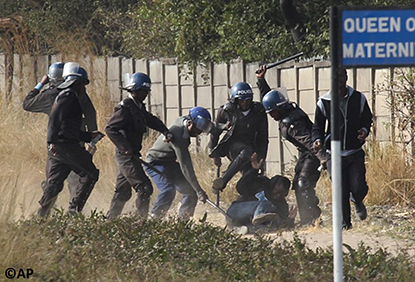
But it cannot go on for much longer, the disparities are just too great, the suffering of the great majority has gone on for too long and the people’s legendary patience is running out. Zimbabwe is on the edge of a precipice and its own leadership has not got a clue about what to do. Certainly what they did yesterday was not the sensible thing to do in any way.
This week the Elders – a grouping that includes Tutu, Mrs Mandela and Annan, called on the SADC leadership, meeting this weekend in Swaziland, to recognise that the crisis in Zimbabwe must be addressed. They noted that a peaceful, dignified, legal and democratic transition is possible, but only if leadership is exercised. Left to our own devices with a paralysed leadership, we can only commit suicide.
In Tolstoy’s play “The Cherry Orchard”, a scarecrow in a wheat field plays a key, if symbolic role. In Zimbabwe, the Old Man of the country was taken from his bed, given a shot of something by his doctors and then trundled out in public to show that he was alive. He nearly fell as he climbed out of his car, had to be helped to walk in slippers at the Show Grounds and then sat silent and half asleep while the Vice President of Sierra Leone opened the Show. This is the leadership that is supposed to guide Zimbabwe away from the precipice. It is just not possible and everyone can now see that.
Like the scarecrow in Tolstoy’s play, he is not going anywhere and this shameful farce in terms of leadership continues while Zimbabwe burns. Our national debt is now approaching three times our GDP; interest on the debt alone is equal to one third of all State revenues. 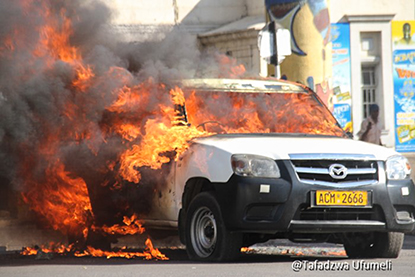 The budget deficit has spiralled out of control. The Civil Service is being paid with virtual money by electronic means but they cannot draw their salaries out of the banks. Even a child can sense that this state of affairs simply cannot go on.
The budget deficit has spiralled out of control. The Civil Service is being paid with virtual money by electronic means but they cannot draw their salaries out of the banks. Even a child can sense that this state of affairs simply cannot go on.
South Africa has suddenly woken up as a result of a massive collapse of the trade with Zimbabwe. Tens of thousands of South African industrial jobs are at stake. Suddenly they appreciate that there is a leadership crisis in the country and that the crazies in the G40 and the Presidents bedroom are trying to take power from the scarecrow’s hands. That would toss us out of the frying pan into the fire.
The international Community agrees with the Elders that an orderly rescue mission is possible and could result in a legal, democratic transition. But it is not going to happen by itself. Leadership of a high order is required and quickly, or else this country is going to plunge over the edge of the precipice and will in turn drag the dual worlds represented by our smoking streets and the Harare golf clubs down together into the abyss.
Robert Mugabe arrives back in Zimbabwe after health scare
After speculation about the President's health - which was sparked by an unannounced flight to Dubai after leaving the SADCC conference prematurely - Robert Mugabe returned to Harare.
“I had gone on a family matter to Dubai concerning one of my children,” he told reporters in the local Shona language, without giving details. He appears to be oblivious that Harare and Bulawayo are smouldering as the UM carrier is commandeered for family matters as though it is a Rixi Taxi.
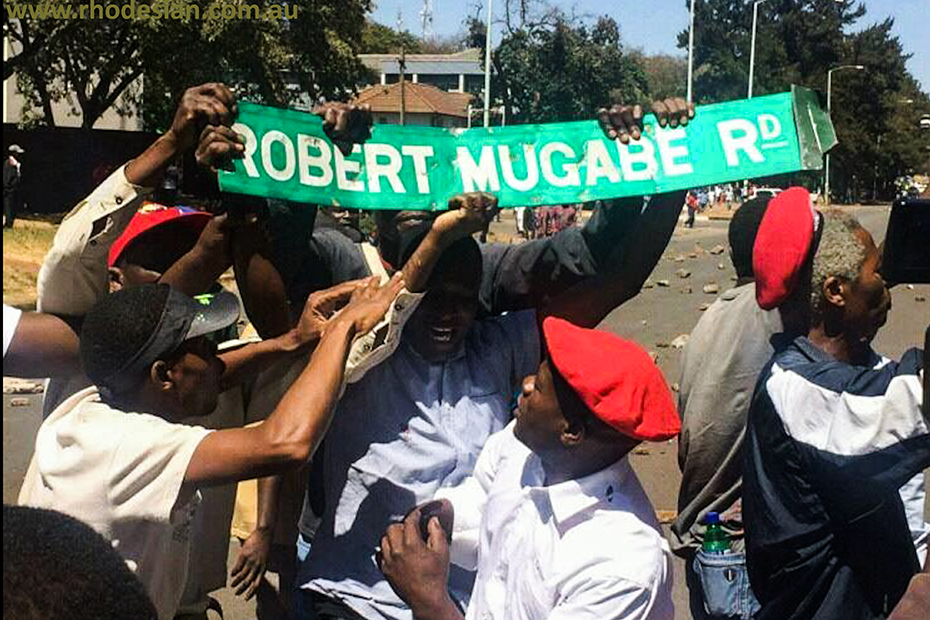 “Yes, I was dead, it’s true I was dead. I resurrected as I always do. Once I get back to my country I am real,” Mugabe added tongue-in-cheek in English, referring to speculation on some online news websites that he had succumbed to illness.
“Yes, I was dead, it’s true I was dead. I resurrected as I always do. Once I get back to my country I am real,” Mugabe added tongue-in-cheek in English, referring to speculation on some online news websites that he had succumbed to illness.
Reports that Mugabe’s health is declining have become common but he has often referred to himself as “fit as a fiddle.”
Mugabe rejects accusations by his political opponents that he has brought one of Africa’s most promising economies to its knees since coming to power at independence from Britain in 1980.
Zimbabwe is struggling to pay salaries to soldiers, police and other public workers, fuelling political tensions including within his ruling ZANU-PF party.
The MDC political party revealed the following thirteen farms which are owned by the President - Gushungo Estates 4046ha Mazowe, Gushungo Dairies 1000ha Mazowe, Iron Mask Estate 1046ha Mazowe, Sigaru Farm 873ha Mazowe, Gwebi Wood 1200ha Mazowe, Gwina Farm 1445ha Banket, Leverdale Farm 1488ha Banket, Highfield Farm 445ha Norton, Cressydale Estate 676ha Norton, Tankatara Farm 575ha Norton, John O’Groat Farm 760ha Norton, Clifford Farm 1050ha Norton and Bassiville 1200ha Norton.
In addition, members of his family own the following farms: Reward Marufu (Grace Mugabe’s late brother) - Leopards Vlei 1294ha Glendale, Kachere Farm 880ha Mazowe; Sabina Mugabe (Robert Mugabe’s late sister) - Mlembwe Farm 1037ha Makonde, Longwood Farm 924ha Makonde and Gowrie Farm 430ha Norton; Leo Mugabe (Robert Mugabe’s nephew) - Diandra 815ha Darwandale, Nangadza 1200ha Mhangura and Journey's End Farm Makonde
"We are coming for you" Mugabe warns Tsvangarai
(Warning - graphic images)
President Robert Mugabe yesterday, while addressing ZANU PF party Central Committee, said he was fast running out of patience with MDC-T leader, Morgan Tsvangirai and other opposition parties and pressure groups protesting against his government, threatening to deal with them decisively. Mugabe said MDC-T and the other opposition parties under the National Electoral Reform Agenda (NERA) should be sternly cautioned of grave consequences, warning them they will not win the war.
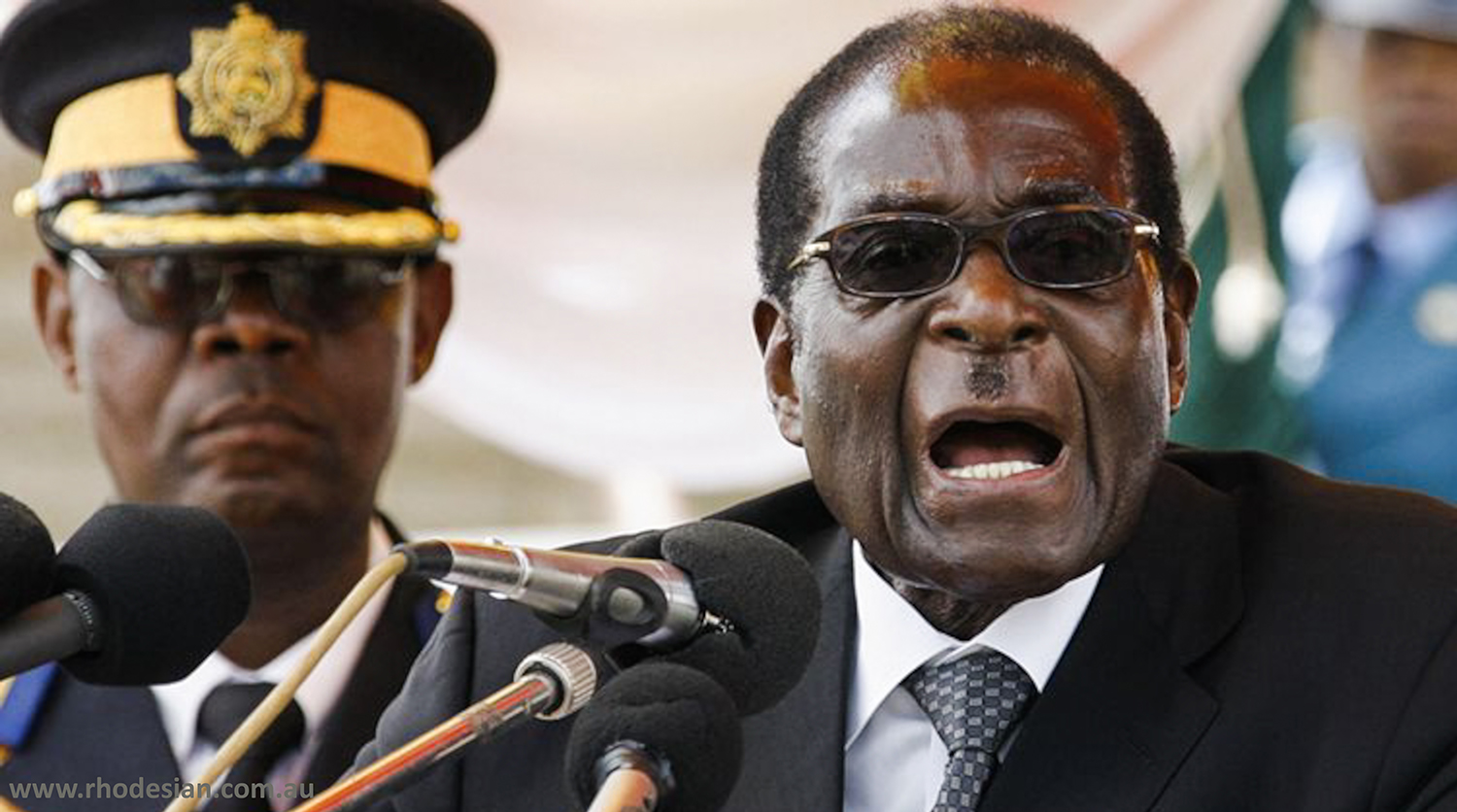 In response, NERA believes ongoing threats by the Ruling Party leadership and attacks from ZANU PF Youth who are being encouraged and funded by ZANU PF are undermining the political process and jeopardizing the country’s security and stability.
In response, NERA believes ongoing threats by the Ruling Party leadership and attacks from ZANU PF Youth who are being encouraged and funded by ZANU PF are undermining the political process and jeopardizing the country’s security and stability.
NERA asserts that the solution to the continued protests by citizens and opposition is through a peaceful, inclusive, transparent orderly election process which NERA continues to advocate for. NERA is calling Robert Mugabe or Heir Apparent Vice President Mnangagwa to recognise that Zimbabwe Citizens and Opposition parties have legitimate demands which should not be dismissed, ignored or teargassed into irrelevance.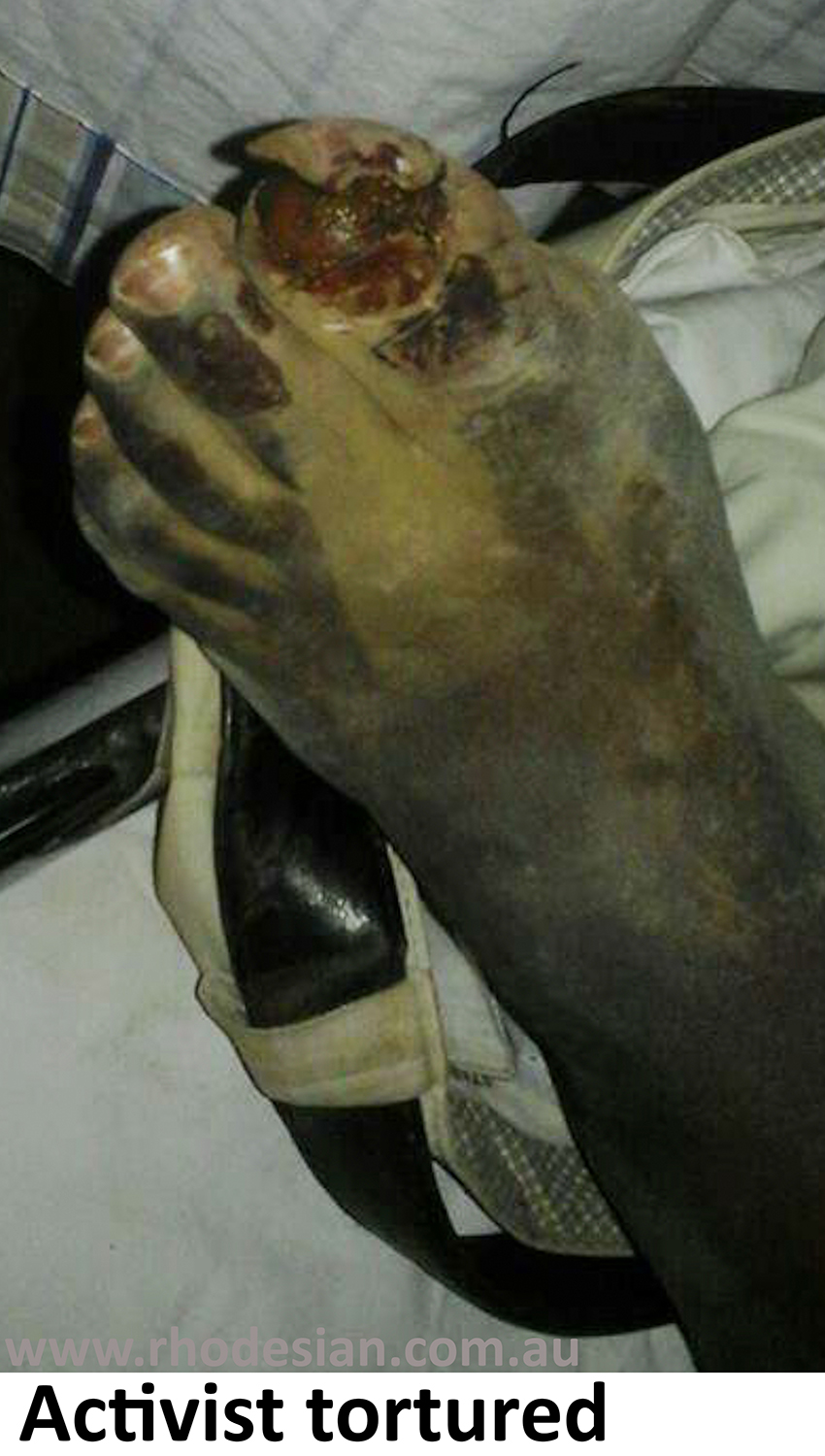
NERA calls for Robert Mugabe, Vice President Mnangagwa and the ZANU PF government to remember that they serve at the pleasure of Zimbabwean people and that the Zimbabwe People have a right to exercise their displeasure at the continued oppression and mismanagement of Zimbabwe. NERA would like to also remind Robert Mugabe, Vice President Mnangagwa and the ZANU PF government that under the Constitution and Electoral Act Zimbabwe is a democracy where opposition politics is a right.
NERA is neither moved nor afraid of the politics of aggression and violence exercised by Robert Mugabe, Vice President Mnangagwa and the ZANU PF government. Although Violence and Aggression are standard operating practice for the Ruling party, NERA will not tolerate this type of aggression and will NEVER cower or back down in the face of the ZANU PF oppressors.
NERA would like to also remind Robert Mugabe, Vice President Mnangagwa and the ZANU PF government that the Zimbabwean people 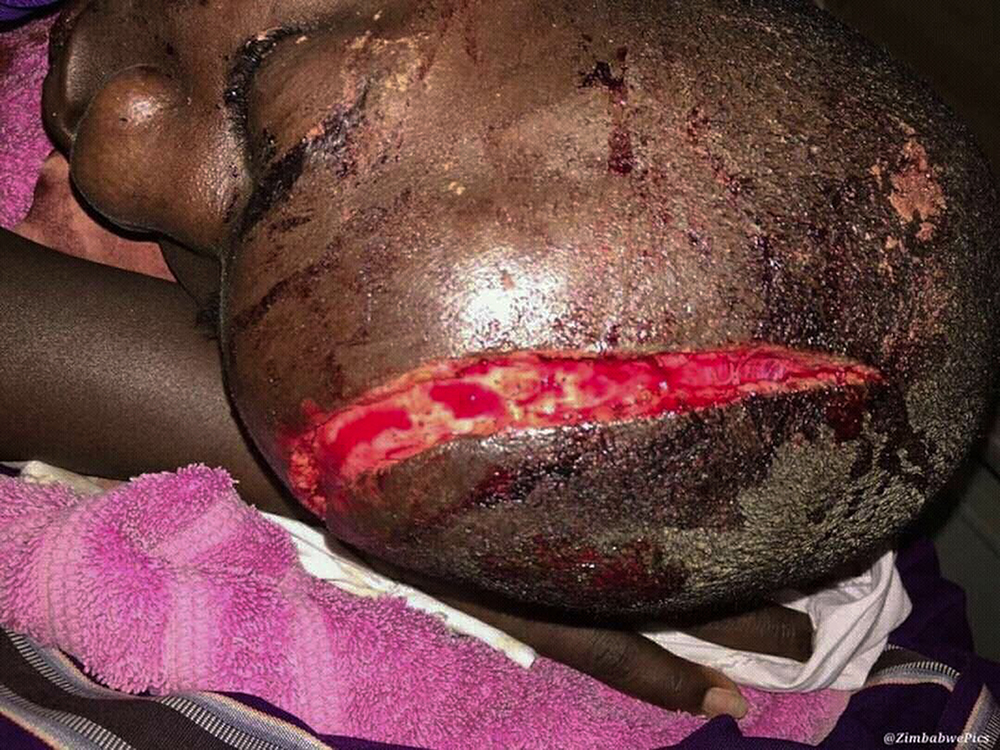 are not Western Sponsored and that the assertion that protests or dissension by Zimbabwean People are sponsored by a foreign entity belittles the problems faced by the Zimbabwean People .
are not Western Sponsored and that the assertion that protests or dissension by Zimbabwean People are sponsored by a foreign entity belittles the problems faced by the Zimbabwean People .
A heavy police presence in Zimbabwe’s capital Harare stopped the planned mass demonstration, as activists claimed police used live ammunition to disperse small protests.
Reports from around the country are:
Number of Arrests 87
Abductions 10
Injured and Assaults 125
Raids 3.
We can't retreat
Despite losing a brother to an abduction, Dr Patson Dzamara continues on his crusade:
"Good to be back home!
"Upon my return to Zimbabwe, I was engulfed with a multitude of emotions. In the quest for a new and better Zimbabwe, I travelled to four countries during the past month and I am glad to inform you that we are making headway.
"As I actively participate in the pursuit of a new and better Zimbabwe, my eyes are constantly opened to new realities. Chief among those is that wherever God leads us, his grace is always available and sufficient. 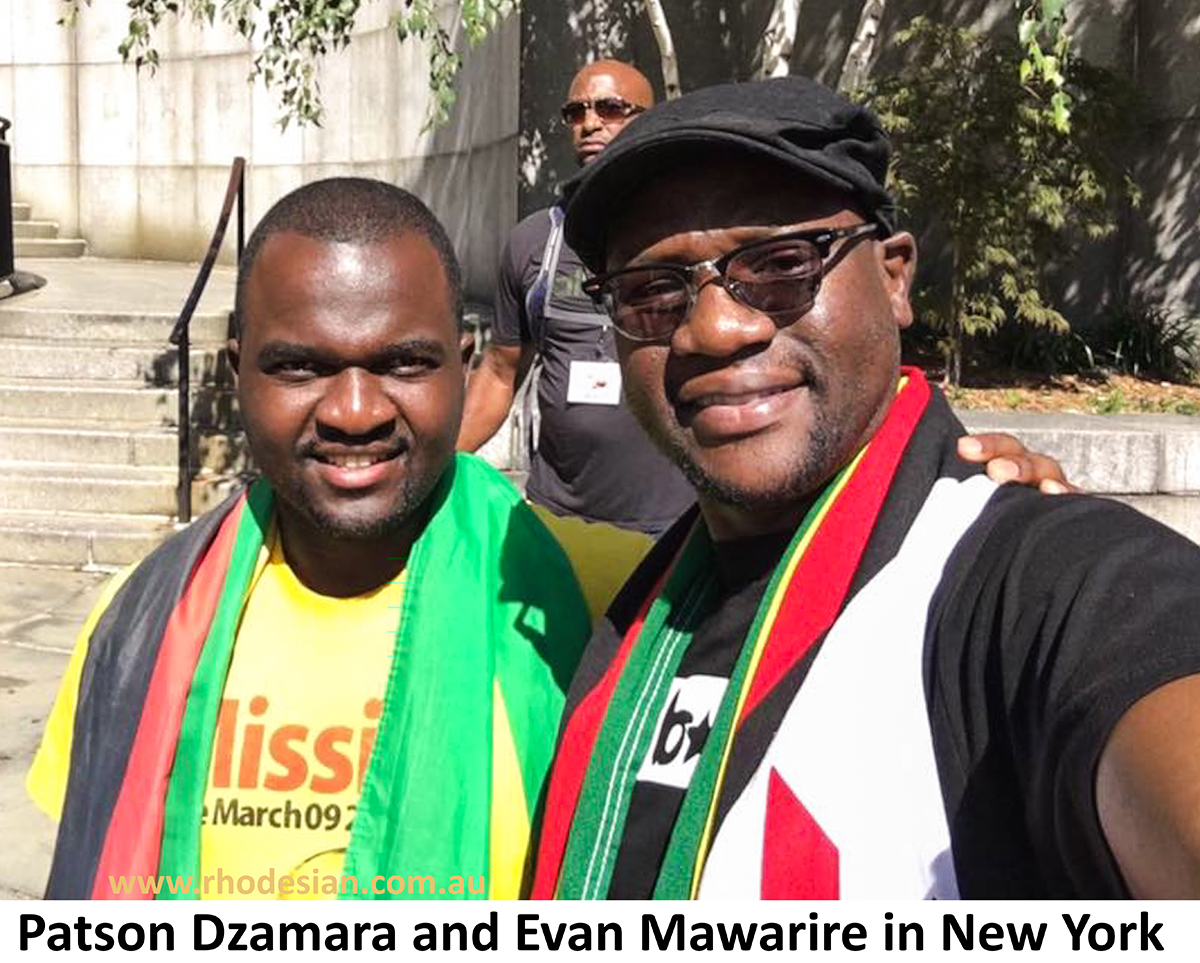
"As soon as I got my passport stamped at the Harare International Airport a certain man (from the system of course) approached me. In under a minute he told me that Mugabe was about to arrive and ZANU PF supporters were milling around the airport, waiting to welcome him. Not only that, he also told me that some actually intended to harm me. With his help, I was able to expedite the process of clearing my bags before he whisked me away. I quickly got onto a cab to a point where my arranged transport picked me. God is amazing, I don't know this person but He used him to protect me.
"Never again shall we the citizens of Zimbabwe lounge back in indifference while politicians urinate on our heads telling us that its rain.
Cognizant of the fact that we carry the responsibility to redeem ourselves out of the despicable hands of ZANU PF, we can't retreat until we are free.
"The road to our freedom is not only long and winding, it is inundated with nefarious detours. It will cost us tears, blood, sweat and even lives but we must stick it out until we welcome a new and better Zimbabwe.
"This is a watershed moment for our nation. We can't lose this moment. As such, I make a commitment to continue doing my best to do my duty to God and my country. I can't run away from my country despite the omnipresence of danger as a result of my resolute stand against Mugabe and his minions' misrule.
"I know no other home than Zimbabwe and I will never run away from Mugabe. I am prepared to die for my convictions and what I believe to be right, if need be.
A new and better Zimbabwe is possible in our lifetime. We shall come face to with it. I pray that God's grace will continue to sustain and lead me so that I may witness the new and better Zimbabwe too.
Activists abducted and beaten ahead of protests
Zimbabwean pro-democracy activists were assaulted and abducted ahead of a planned demonstration dubbed #MunhuWeseMuRoad.
Sources on the ground, which could not be identified for fear for their safety, told IBTimes UK that men abducted and beat half a dozen activists who had been calling for Zimbabweans to gather and protest in the March Against Bond Notes in the capital Harare on Friday, 18th November, 2016.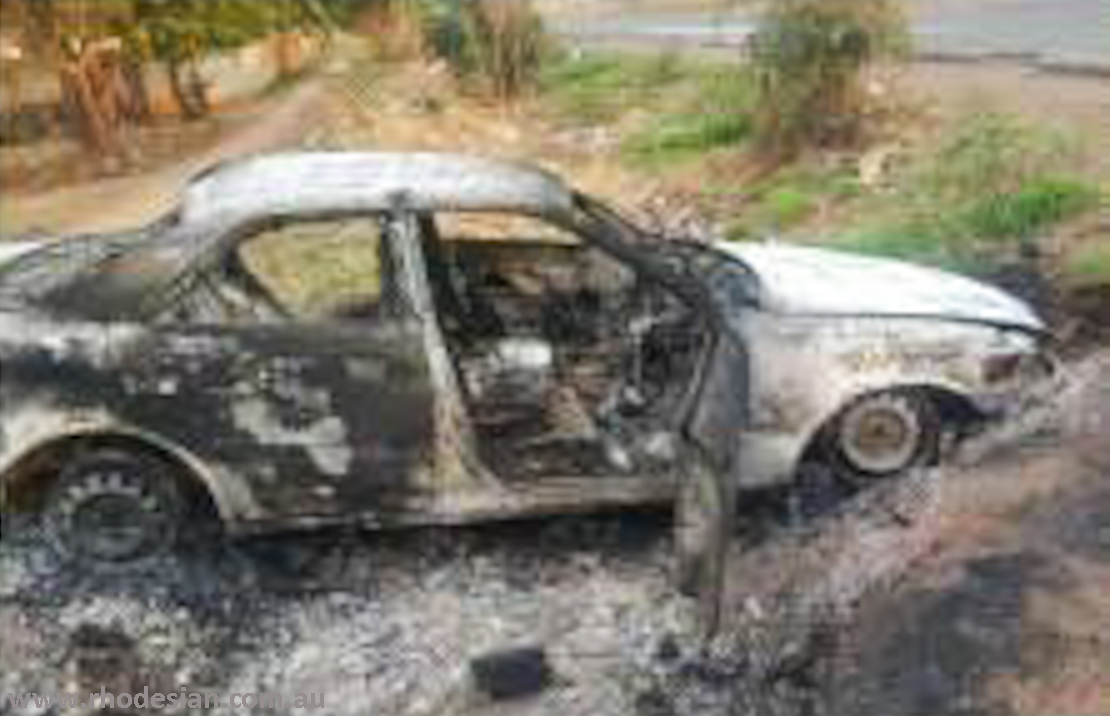
Prominent political activists Patson Dzamara, Ishmael Kauzani and Sten Zvorwadza, who were shuttling from one safe house to another, were reportedly ambushed by between 12 and 14 men in three twin-cab vehicles around Mukonohono and Glen Eagles Road. According to the sources, several of these men were wearing police clothes, while others were plain clothed. Dzamara and Kauzani's vehicles were blocked and one was rammed into a ditch.
"As [the activists] were running out of the vehicles, the men started beating them up, took Patson and shoved him into another vehicle and continued to beat up the other guys," activist Promise Sande confirmed.
Kauzani claimed that several rounds of bullet shots were fired as the activists tried to run away. Zvorwadza and Kauzani, whose car was torched, were "badly beaten" but both men 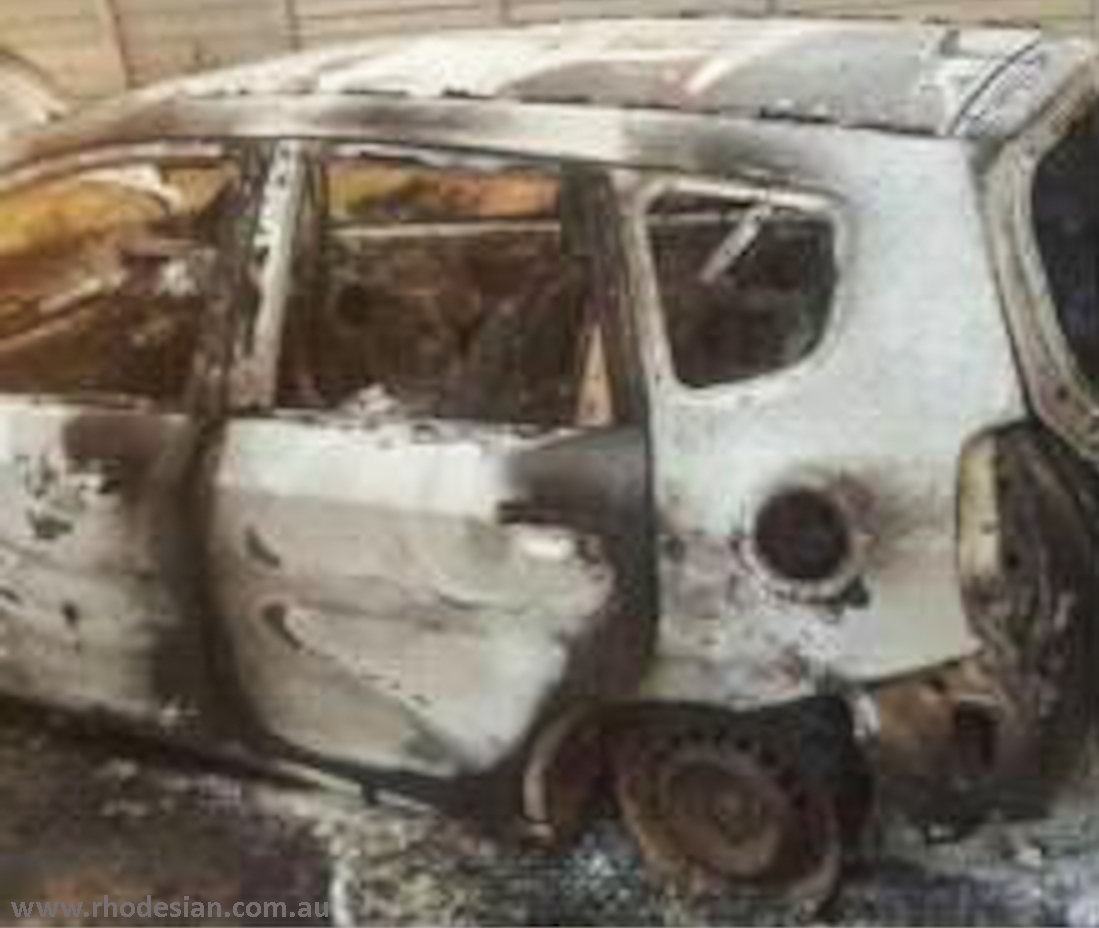 managed to escape, sources confirmed. Another activist who was in the vehicle with the movement leaders was reportedly missing a front tooth.
managed to escape, sources confirmed. Another activist who was in the vehicle with the movement leaders was reportedly missing a front tooth.
Sande alleged that uniformed men "tried to shove some of the guys [activists] into the burning cars."
Dzamara, whose brother and activist Itai Dzamara disappeared while protesting against the Zimbabwean government in March 2015 and has been missing since, was taken away, stripped naked and tortured before being dumped on the Harare-Bulawayo Road. He was admitted to the Avenues Clinic on Mazowe Street in Harare. "He is quite badly beaten, on his back, but not severely injured," the source said, after speaking to Dzamara.
Three activists are still missing.
Pastor Evan returns to Zimbabwe and is arrested
"Pastor Evan is back in Zimbabwe! Please uplift this brave and dynamic Pastor in prayer. He was immediately arrested and is being charged with treason - in the true way of tyrannical states. Other Pastors and church leaders are already rallying around him. It is uncertain as to whether he will be brought to court tomorrow or on Friday. So please pray against continuing injustice against this innocent man. God bless you all." Ben Freeth, 2nd February 2017. Facebook
One report says that he was detained at the Harare airport and charged under the same charges as last year - subverting a constitutionally elected Government. After six months in exile in USA, he arrived on a scheduled flight from Johannesburg.
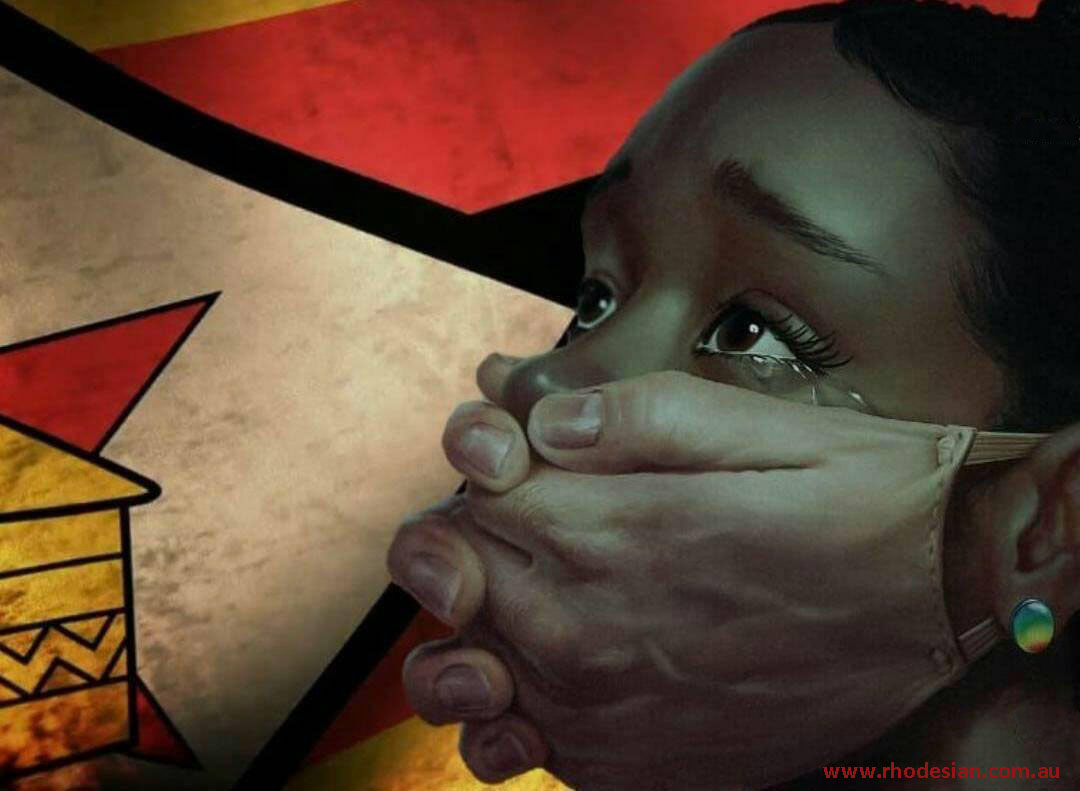 "I can't help thinking of the cowardly magistrate, Elisha Singano, who has kept Pastor Evan in jail. Shame on him! What an unjust act. He knows just like the State Prosecutor and the 9 CIO guys that arrested him know, that Pastor Evan is innocent. Cowardliness is such a problem amongst us. May Pastor Evan be a Joseph in our midst!" Ben Freeth, 4th February 2017, Facebook
"I can't help thinking of the cowardly magistrate, Elisha Singano, who has kept Pastor Evan in jail. Shame on him! What an unjust act. He knows just like the State Prosecutor and the 9 CIO guys that arrested him know, that Pastor Evan is innocent. Cowardliness is such a problem amongst us. May Pastor Evan be a Joseph in our midst!" Ben Freeth, 4th February 2017, Facebook
#ThisFlag posted this message on Facebook on 17th February 2017: "Update from the courts earlier today. Matter has been postponed to March 16 because the state was not ready. Our resolve remains steady in uniting the citizens of Zimbabwe as we prepare for the coming season of change."
Listen to Pastor Evan here
Coup removes Grace and Robert Mugabe
The 93 year old had been withering under increasing physical and perhaps mental frailty and by mid-November it appeared as though power was been exercised by his wife, Grace, and the faction around her. There
had been manoeuvrings to do with the succession. The vice-president and long-term heir apparent, Emmerson Mnangagwa, was unceremoniously sacked by 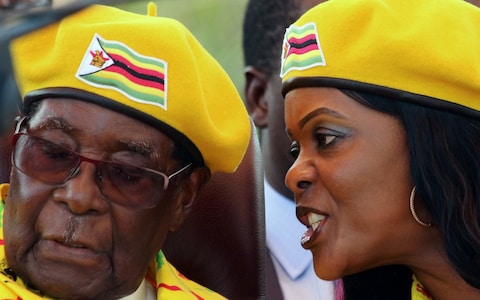 Grace and her faction earlier this month, and fled to South Africa, claiming his life was in danger. It seemed Grace had won the succession struggle. However, faced with the prospect of Mugabe II, that is, President Grace, the army decided to act. They took over the government.
Grace and her faction earlier this month, and fled to South Africa, claiming his life was in danger. It seemed Grace had won the succession struggle. However, faced with the prospect of Mugabe II, that is, President Grace, the army decided to act. They took over the government.
Earlier, Zimbabwe's army denied it had carried out a coup after taking over the state broadcaster in the early hours of Wednesday, even as military vehicles took to the streets of the Zimbabwean capital and prolonged gunfire was heard near the presidential residence. Military officers read an address live on state TV, saying President Robert Mugabe was "safe" and his "security is guaranteed".
"It is not a military takeover of government," an army spokesman said in a televised statement. "We wish to assure the nation that his excellency the president... and his family are safe and sound and their security is guaranteed.
"We are only targeting criminals around who him who are committing crimes that are causing social and economic suffering in the country in order to bring them to justice.
"As soon as we have accomplished our mission we expect that the situation will return to normalcy." The address came hours after several loud explosions echoed across central Harare and troops seized the headquarters of the ZBC, Zimbabwe's state broadcaster.
"Although it doesn’t look like a coup, it is a coup,” Zimbabwe analyst Alex Magaisa, a senior Zimbabwe legal analyst based in the UK, told The Telegraph.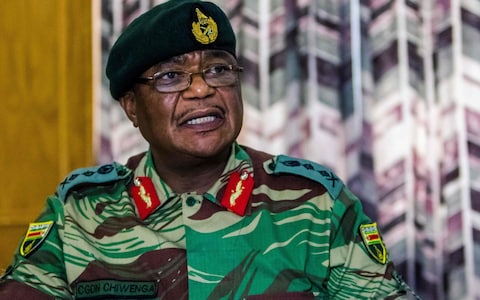
Several cabinet ministers, including local government minister Saviour Kasukuwere and finance minister Ignatius Chombo, and Mugabe’s nephew Patrick Zhuwayo, were arrested. There was allegedly a brief gun fight outside Mr Chombo’s house.
Speculation had been mounting throughout the day that a coup was under way against Mr Mugabe, after the head of the armed forces threatened to "step in" over the sacking of an influential vice president. Zimbabwe's ruling party accused General Constantine Chiwenga of treason over his comments, after the rare appearance of the military vehicles in Harare.
Gunfire erupted near Mr Mugabe's private residence in Harare in the early hours of Wednesday, a witness told AFP.
"From the direction of his house, we heard about 30 or 40 shots fired over three or four minutes soon after 2.00 am," a resident who lives close to Mugabe's mansion in the suburb of Borrowdale said. Armed soldiers were assaulting passers-by in the early morning hours in Harare, according to the Associated Press, while officers were seen loading ammunition near a group of four military vehicles. Aggressive soldiers told passing cars to keep moving through the darkness. "Don't try anything funny. Just go," one told a Reuters reporter on Harare Drive.
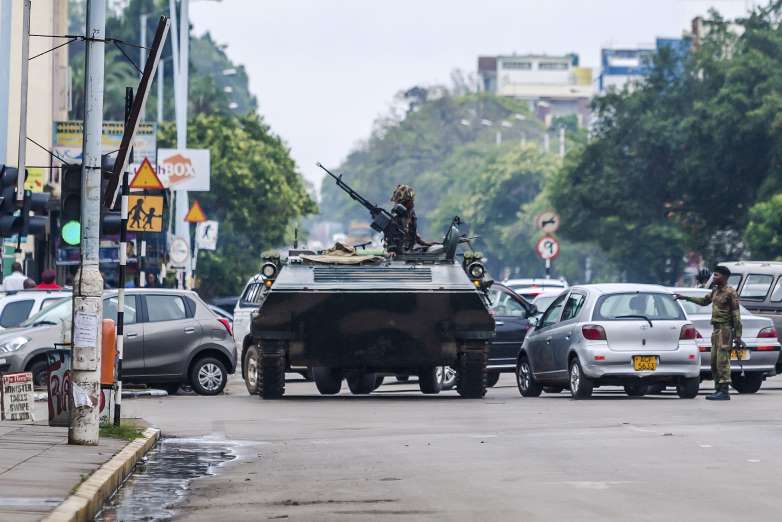 Two hours later, soldiers overran ZBC, a principal Mugabe mouthpiece, and ordered staff to leave. Several ZBC workers were manhandled, two members of staff and a human rights activist said. Shortly afterwards, three explosions rocked the centre of the southern African nation's capital, near the University of Zimbabwe campus, witnesses said.
Two hours later, soldiers overran ZBC, a principal Mugabe mouthpiece, and ordered staff to leave. Several ZBC workers were manhandled, two members of staff and a human rights activist said. Shortly afterwards, three explosions rocked the centre of the southern African nation's capital, near the University of Zimbabwe campus, witnesses said.
The move was widely seen as part of a battle between Mr Mnangagwa and Grace Mugabe, the first lady, over the presidential succession when Mr Mugabe dies or steps down. The Zimbabwean president, who is 93, fights his last election next year.
Many expected Mrs Mugabe to be appointed vice president in Mr Mnangagwa’s place at the Zanu PF special congress next month.
Gen Chiwenga, an ally of Mr Mnangagwa, demanded on Monday that Mr Mugabe immediately cease “purging” the former vice president's allies in the party and in government.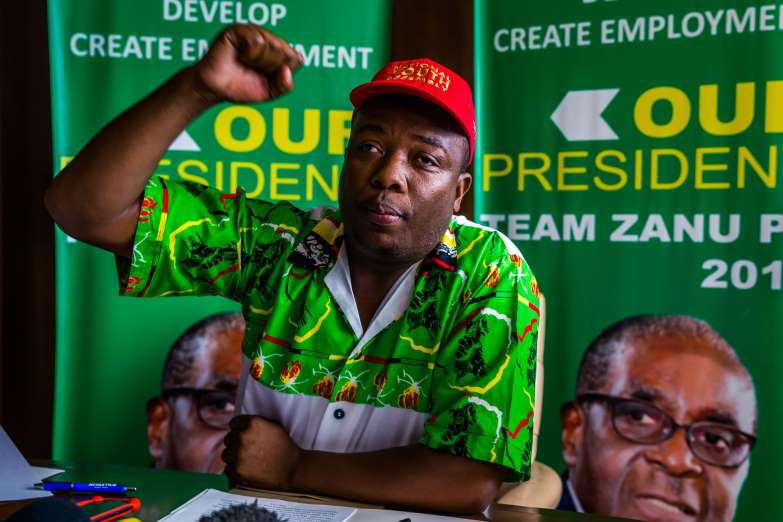
"We must remind those behind the current treacherous shenanigans that when it comes to matters of protecting our revolution, the military will not hesitate to step in," the head of the armed forces commander said.
In a statement issued on Tuesday evening, ZANU-PF accused Gen Chiwenga of "treasonable conduct."
Earlier on Tuesday Kudzai Chipanga, the leader of ZANU-PF's youth wing, accused Gen Chiwenga of stealing billions of rands and said his movement would act to protect the president.
"We as ZANU-PF youth league are a lion which has awakened and found its voice, therefore we will not sit idly and fold our hands whilst cheap pot-shots and threats are made against Mugabe,” he said in a statement widely released on social media.
Emmerson Mnangagwa, who fled Zimbabwe after he was sacked as vice president on November 6, made a triumphant return to the country on Wednesday, 22nd November 2017, a day after 93-year-old Mugabe resigned.
Mugabe's departure after 37 years in power followed an intense week with the military staging a government takeover, the commencement of impeachment proceedings and citizens taking to the streets in protest.
Mnangagwa will serve Mugabe's remaining term until elections next year. Opposition lawmakers who have alleged vote-rigging in the past say that balloting must be free and fair.
The resignation was met with wild celebrations across Harare. People were thrilled to be rid of a leader whose early promise, including an emphasis on education, was overtaken by economic collapse, government dysfunction and human rights violations.
Gukurahundi architect and minister Perrance Shiri dies aged 65
Perrance Shiri, the former army general blamed for the deaths of thousands of minority Ndebele people in post-independence war massacres died on 29th July 2020.
Shiri was agriculture minister after retiring as Air Force commander in 2017, having plotted with other military commanders to topple the late former president Robert Mugabe.
Shiri, who was not married, died alone in his vehicle in the early hours of Wednesday while trying to drive himself to a private hospital nearby, ZimLive understands. He called two trusted friends – Norton MP Temba Mliswa and his ministry’s permanent secretary John Bhasera – to come to his assistance, but he was dead by the time they arrived.
Sources said he had Covid-19. His driver was buried last Saturday after succumbing to the respiratory disease caused by the coronavirus.
Shiri missed Cabinet on Tuesday after being advised to self-quarantine at home. He visited a private hospital in Belgravia on Monday and Tuesday, but was allowed to return home.
He was born Bigboy Samson Chikerema and was Perrance Shiri was a cousin of former President Robert Mugabe.[
From 1983 to 1984, the Zimbabwean Fifth Brigade, under Shiri's command, was responsible for a reign of terror in Matabeleland. During the slaughter, thousands of civilians were killed and thousands more were tortured. He called himself "Black Jesus" because he could say if you live or not. Despite this, in 1986, Shiri was granted a place at the Royal College of Defence Studies in London.
In 1992, Shiri was appointed as the commander of the Air Force of Zimbabwe, taking over from Air Chief Marshal Josiah Tungamirai.
Shiri was in command of the Zimbabwean troops at the start of the Second Congo War and 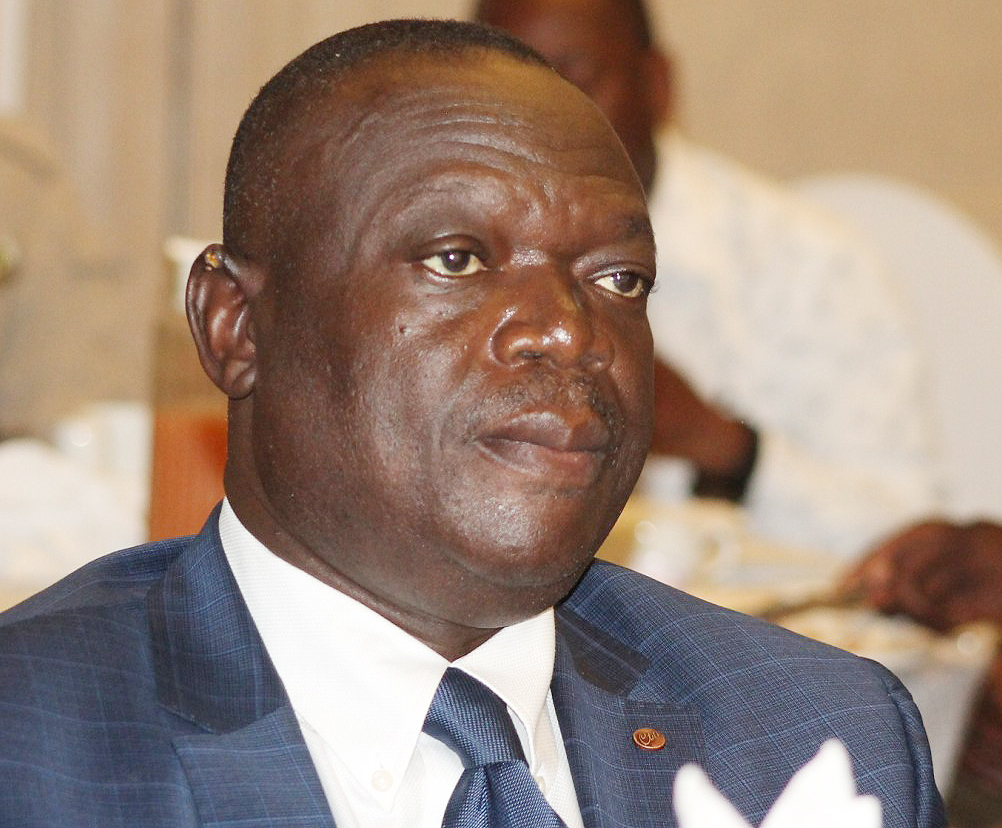 decided that the Zimbabwean contingent would defend N'Djili and its airport at Kinshasha so maintained an air route.
decided that the Zimbabwean contingent would defend N'Djili and its airport at Kinshasha so maintained an air route.
In the late-1990s and early-2000s, Shiri was reported to have organised farm invasions by war veterans.
In 2002, in response to the subsequent food shortage, Mugabe dispatched Shiri to South Africa to purchase maize. This undertaking was backed by the Libyan leader, Colonel Gaddafi.
With the Mugabe government facing increasing problems, the Zimbabwean press reported in February 2007 that Shiri was regularly attending General Solomon Mujuru’s unofficial meetings with other senior military commanders and some political leaders. These meetings had been discussing the replacement of the president. Solomon Mujuru died in a fire in the early hours of the night of 15 August 2011, at the homestead of Alamein Farm, in circumstances that many commentators suggest were suspicious
Shiri was ambushed on 13 December 2008 while driving to his farm. According to police, he was accosted by unknown people who shot at his car. Thinking one of his tyres had burst, he got out and was shot in the arm. It has been speculated that the assassination attempt was a response to Shiri's attacks on illegal diamond miners in 2008 or because of his role in Matabeleland in the 1980s.
The main opposition Movement for Democratic Change accused Shiri of being among the security chiefs who organised violence against its members after Mugabe lost the first round of the presidential vote in 2008.
Shiri was influential in orchestrating the 2017 Zimbabwean coup d'état which removed Mugabe from power.On 30 November 2017, Shiri was appointed Minister of Agriculture by President Emmerson Mnangagwa and he was promoted from Air Marshal to Air Chief Marshal
He commanded the army’s 5 Brigade unit that carried out the 1980s massacres of thousands of civilians in western Zimbabwe, as the government sought to quell what it said was an insurgency.
The army massacres, known as “Gukurahundi”, a Shona term meaning the “early rain that washes away the chaff”, remain a sore point for the people of the Matabeleland region, many of whom demand justice and reparations.
Shiri was known as ‘Black Jesus’ because he could decide whether victims lived or died.
Rights groups say as many as 20,000 people died in the crackdown between 1983 and 1987, when the two liberation war movements ZANU and PF ZAPU inked a unit pact to end the killings.
Former Mugabe minister Jonathan Moyo, whose father was killed by the 5 Brigade, wrote on Twitter: “It’s tragic that Perrance Shiri has departed without facing justice over the Gukurahundi atrocities he committed in Matabeleland and Midlands provinces in the 1980s; nor telling the truth about those atrocities to help heal the nation.”
Death of Mugabe aged 95 in Singapore BBC news, 2019
Robert Mugabe, the Zimbabwean independence icon turned authoritarian leader, has died aged 95 on 6th September 2019. Mr Mugabe had been receiving treatment in a hospital in Singapore since April. He was ousted in a military coup in 2017 after 37 years in power.
The former president was praised for broadening access to health and education for the black majority. But he will be remembered for violent repression of his political opponents and Zimbabwe's economic ruin and his legacy is likely to haunt Zimbabwe for years.
Robert Gabriel Mugabe was born in Kutuma in the Zvimba district of Mashonaland West province on 21st February 1924, the son of a carpenter and one of the majority Shona-speaking people. Educated at Roman Catholic mission schools, he qualified as a teacher.
Winning a scholarship to Fort Hare University in South Africa, he took the first of his many degrees before teaching in Ghana, where he was greatly influenced by the pan-Africanist ideas of Ghana's post-independence leader Kwame Nkrumah. His first wife Sally was Ghanaian.
In 1960, Mugabe returned to Rhodesia. At first he worked for the African nationalist cause under Joshua Nkomo who was founding president of ZAPU.
In 1964, after making a speech he was arrested and detained for a decade.
In 1973, while still in detention, he was chosen as president of ZANU. After his release, he went to Mozambique and was political head of ZANLA under Josiah Tongorara. After Tongorara’s death on 26th December 1979 as a passenger in a motor accident on the road between Maputo and Chimoio, Mugabe assumed full control from the popular leader.
The Lancaster House agreement of 1979 set up a constitution for the new Republic of Zimbabwe, as Rhodesia was to be called, and set February 1980 for elections.
Fighting the election on a separate platform from Nkomo – whereas Tongorara had favoured a combined campaign - ZANU secured a comfortable majority, although the polls were marred by accusations of vote-rigging and intimidation from both sides.
A self-confessed Marxist, Robert Mugabe was Prime Minister and Rev Canaan Banana became the first President of Zimbabwe.
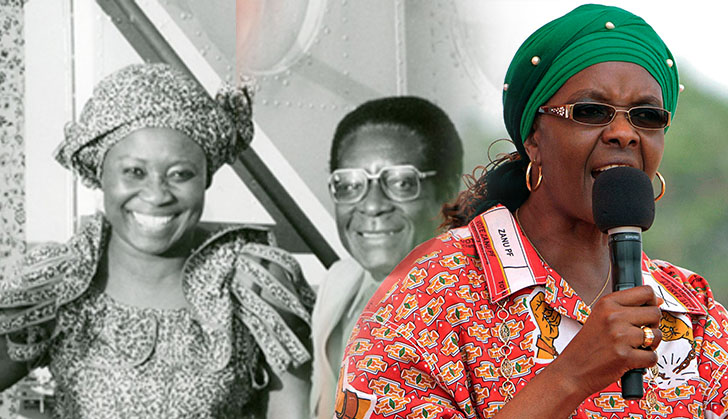 Later in 1980 Mugabe outlined his economic policy, which mixed private enterprise with public investment. He launched a programme to massively expand access to healthcare and education for black Zimbabweans, who had been marginalised under white-minority rule.
Later in 1980 Mugabe outlined his economic policy, which mixed private enterprise with public investment. He launched a programme to massively expand access to healthcare and education for black Zimbabweans, who had been marginalised under white-minority rule.
With the prime minister frequently advocating one-party rule, the rift between Mugabe and Nkomo widened. Nkomo was demoted in a cabinet reshuffle then was dismissed from government.
While paying lip service to democracy, Mugabe gradually stifled political opposition.
The mid-1980s saw the massacre of thousands of ethnic Ndebeles seen as Nkomo's supporters in his home region of Matabeleland.
Mugabe was implicated in the killings, committed by the Zimbabwean army's North Korean-trained 5th Brigade, but was never brought to trial. Nor was Perrence Shiri, the commander of the 5th Brigade nor Emmerson Mnangagwa. Under intense pressure, Nkomo agreed for his ZAPU to be merged with - or taken over by - ZANU to become the autonomous ZANU-PF.
After abolishing the office of prime minister, Mugabe became President in 1987 and was elected for a third term in 1996 in the one-party state.
In August 1996, he married Grace Marufu, after his first wife had died from chronic kidney failure on 27th January 1992. Mugabe already had two children with Grace his former secretary, 40 years his junior. A daughter, Bona, was born in 1988 and a son, Robert, was born in 1990. Chatunga Bellarmine was born in 1997 when the President was 73.
Robert Mugabe introduced the Land Acquisition Act in 1992, permitting the confiscation of land without appeal.
In early 2000, with his presidency under serious threat from the newly formed Movement for Democratic Change (MDC), led by former trade union leader Morgan Tsvangirai, Mugabe lashed out against the farmers, seen as MDC backers.
His supporters, the so-called "war veterans", occupied white-owned farms and a number of farmers and their black workers were killed.
The action served to undermine the already battered economy as Zimbabwe's once valuable agricultural industry fell into ruin. Mugabe's critics accused him of distributing farms to his cronies, rather than the intended rural poor.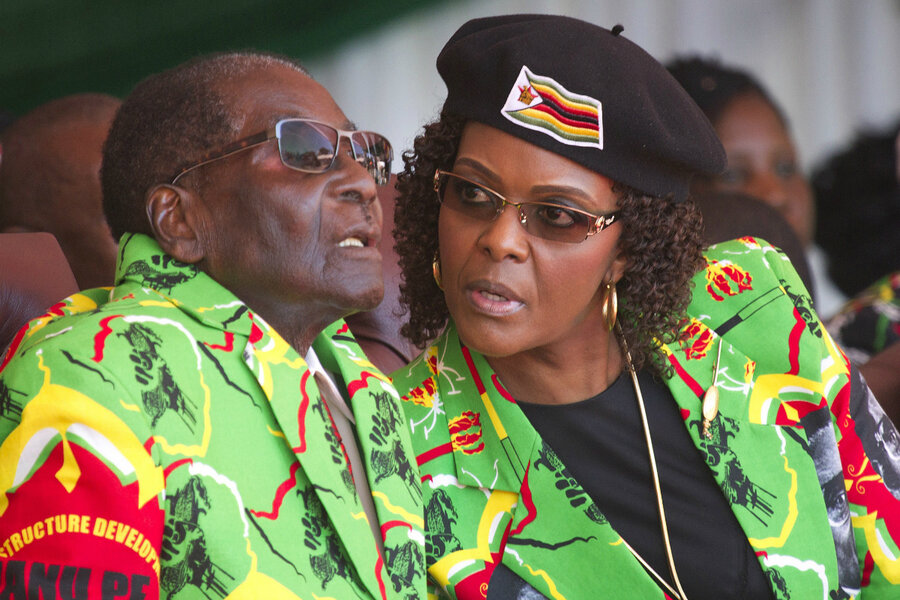
Zimbabwe moved rapidly from being one of Africa's biggest food producers to having to rely on foreign aid to feed its population.
In the 2000 elections for the House of Assembly, the MDC won 57 out of the 120 seats elected by popular vote, although a further 20 seats were filled by Mugabe's nominees, securing Zanu-PF's hold on power.
Two years later, in the presidential elections Mugabe was declared the winner against a background of intimidation of MDC supporters. Large numbers of people in rural areas were prevented from voting by the closure of polling stations.
The USA, UK and the European Union did not recognise the election result because of the violence and allegations of fraud, Mugabe - and Zimbabwe - became increasingly isolated.
The Commonwealth also suspended Zimbabwe from participating in its meetings until it improved its record as a democracy.
In March 2008, Mugabe lost the first round of the presidential elections but won the run-off in June after Mr Tsvangirai pulled out. In the wake of sustained attacks against his supporters across the country, Mr Tsvangirai maintained that a free and fair election was not possible. He fundamentally wanted to prevent needless bloodshed.
Zimbabwe's economic decline accelerated, with inflation rates reaching stratospheric levels.
After hundreds of people died from cholera, partly because the government could not afford to import water treatment chemicals, Mugabe agreed to negotiate with his long-time rival about sharing power.
After months of talks, in February 2009 Mugabe swore in Mr Tsvangirai as prime minister.
It came as no surprise that the arrangement was far from perfect, with constant squabbling and accusations by some human rights organisations that Mugabe's political opponents were still being detained and tortured. Mr Tsvangirai's reputation was tainted by his association with the Mugabe regime, despite the fact that he had no influence over the increasingly irascible president.
Mugabe won the 2013 election and the power-sharing agreement was terminated. The
UN Secretary-General Ban Ki-moon asked that the usual accusations of electoral fraud be investigated.
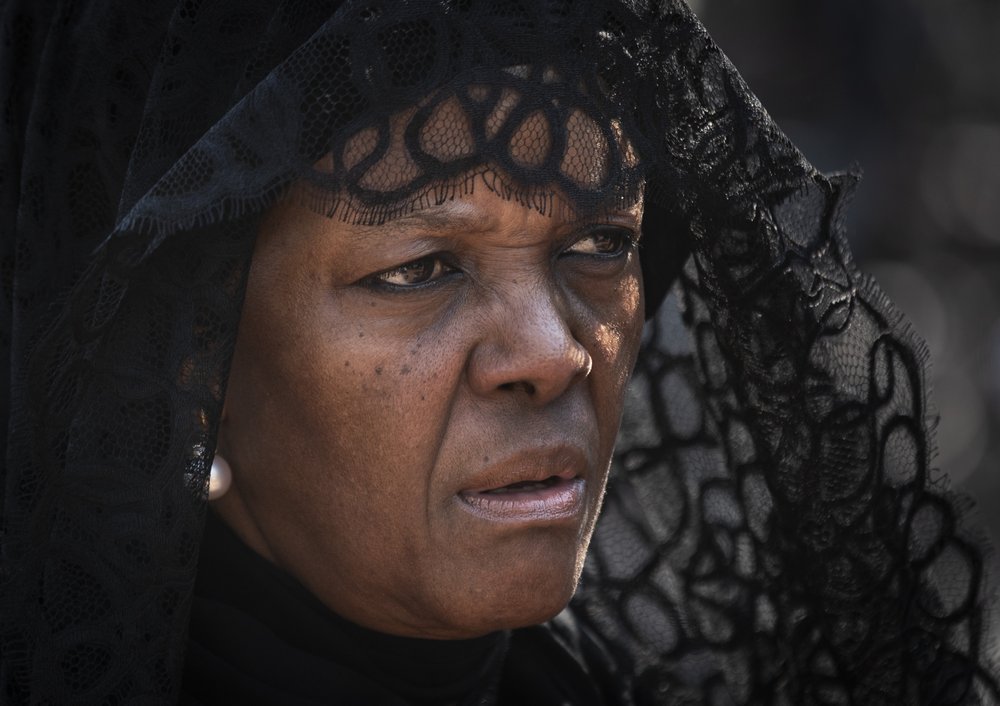 Despite that, Robert Mugabe, at the age of 89, confirmed his position as the undisputed power in the country. His advancing years, and increasing health problems, saw much speculation as to who might replace him.
Despite that, Robert Mugabe, at the age of 89, confirmed his position as the undisputed power in the country. His advancing years, and increasing health problems, saw much speculation as to who might replace him.
Mugabe himself seemed to delight in playing off his subordinates against each other in a deliberate attempt to dilute whatever opposition might arise. With speculation that he was preparing for his wife, Grace, to be appointed a Vice-President to enable her to take control in the event of his death in office, the trigger point had been reached.
His former protégé Emmerson Mnangagwa had been demoted as Vice-president so the vacancy had been created for Grace. Such a handover was unacceptable to the military leaders who, in turn had a long standing relationship with Emmerson Mnangagwa. Mnangagwa promptly fled to South Africa for his safety.
Units of the Zimbabwe National Army came for Robert Mugabe. On 15th November 2017 he was placed under house arrest and, four days later, replaced as the leader of Zanu-PF by his former Vice-president.
Defiant to the end and barricaded at home, Mugabe refused to resign. But, on 21 November, as a motion to impeach him was being debated in the Zimbabwean parliament, the speaker of the House of Assembly announced that Robert Mugabe had finally resigned.
Mugabe negotiated a deal which protected him and his family from the risk of future prosecution and enabled him to retain his various business interests. He was also granted a house, servants, vehicles and full diplomatic status.
Ascetic in manner, Robert Mugabe dressed conservatively and drank no alcohol. He viewed both friend and foe with a scepticism verging on the paranoid.
The man who had been hailed as the hero of Africa's struggle to throw off colonialism had turned into a tyrant, trampling over human rights and turning a once prosperous country into an economic basket case.
The African is traditionally raised to respect the elders. Due to his age and longevity in the role, as the most senior statesman he was not admonished by the SADC nor the OAU/AU despite his brutal treatment of political opponents and his economic mismanagement of a once prosperous country as he dragged Zimbabwe into the abyss. The exception was Ian Khama, in Botswana who delicately voiced his grievances. He was asked in 2016 if Mugabe should accept the reality of his advancing years and retire, 63-year-old Khama responded: “Without doubt. He should have done it years ago.”
“They have got plenty of people there who have got good leadership qualities who could take over,” Khama continued.
“It is obvious that at his age and the state Zimbabwe is in, he’s not really able to provide the leadership that could get it out of its predicament,” Khama said. His mother Ruth was British. The unrest in Zimbabwe was spilling over into the small neighbouring state. Botswana is home to 100,000 Zimbabweans which stretch the resources of this small nation and their jails held 'significant numbers' from Zimbabwe.
“My opinion has always been that 10 years leading any kind of organization - not just a country or a government, any organization - is pretty much the maximum,” he said.
Accordingly, two years later, Ian Khama stepped aside for his Vice President on 1st April 2018 after his ten year term was concluded. At the other extreme, Mugabe died away from Africa within two years after his removal by a coup d’état after ruling for more than 37 years.
Key office bearers and timelines of Zimbabwe
| Election date * | 14th February 1980 |
| Robert Mugabe, Prime Minister (1st) | 18th April 1980 – 31st December 1987 |
| Canaan Banana, President (1st) | 18th April 1980 – 31st December 1987 |
| Robert Mugabe, President (2nd) ** | 31st December 1987 – 21st November 2017 |
| Simon Muzenda, First Vice-President (1st) | 31st December 1987 – 20th September 2003 |
| Joshua Nkomo, Second Vice-President (1st) | 6th August 1990 – 1st July 1999 |
| Joice Mujuru, First Vice-President (2nd) | 6th December 2004 – 10th December 2014 |
| Emmerson Mnangwagwa, First V-P (3rd) | 10th December 2014 – 6th November 2017 |
| Mnangwagwa flees to Mozambique then South Africa | 8th November 2017 |
| Army coup d'etat | 15th November 2017 |
| Robert Mugabe sacked from ZANU-PF | 19th November 2017 |
| Robert Mugabe resigned as President | 21st November 2017 |
| Mnangwagwa returns from South Africa | 22nd November 2017 |
| Emmerson Mnangagwa, President (3rd) | 24th November 2017 – present |
| Cabinet dissolved | 27th November 2017 |
| Constantine Chiwenga, First V-P (4th) | 28th December 2017 – present |
| Kembo Mihadi, Second V-P (5th) | 28th December 2017 – 1st March 2021 |
| Vacancy, Second Vice-President | 1st March 2021 – present |
* In the February 1980 election, Robert Mugabe (ZANU) won 63% of the common roll vote and had an outright majority with 57 seats out of the 100. Joshua Nkomo (ZAPU) won 24.1% of the common roll and had 20 seats. Abel Muzorewa (UANC) won 8.3% of the common roll vote and had 3 seats. Ian Smith (RF) won 83% of the White vote and got all 20 of the White Roll seats.
** The White Roll seats were abolished in 1987 and the Senate was abolished in 1989 and the House of Assembly was expanded to 120 seats.
In 2005, the Senate was reintroduced and the House of Assembly expanded.
Sources
ABC news: Zimbabwe: Military chief puts Mugabe under house arrest; says takeover 'not a coup'. 16th November 2017. Open here
Amnesty International, Zimbabwe five years on whereabouts of journalist and pro-democracy activist still a mystery. March 9, 2020. Open here.
AP, AFP, Reuters, 2018. "Army opens fire on opposition protesters in Zimbabwe capital during wait for election results". 2nd August 2018. news.com.au. Open here.
Baker, Jill, 2016. "The people rise in anger and desperation". Facebook post by Noreen Welch.
BBC news, 2017. Zimbabwe crisis: Army takes over, says Mugabe is safe. 15th November, 2017. Open here.
BBC news, 2018. “Itai Dzamara: The man who stood up to Zimbabwe's Robert Mugabe and vanished”. 24th May 2018. Open here.
BBC news, 2019. “Robert Mugabe, Zimbabwe's strongman ex-president, dies aged 95”. Open here.
BBC news, 2019. “Obituary: Robert Mugabe, Zimbabwe's first post-independence leader”. 6th September 2019. Open here.
Bloomberg, 2017. Zimbabwe's Ousted Vice President Flees After Death Threats, Bloomberg News, USA, 8th November 2017.
Brock, J. and Dzirutwe, M., 2018. "President Emmerson Mnangagwa has been declared the winner of Zimbabwe's election". news.com.au. 3rd August, 2018.
Buchanan, Elsa, IB Times UK, 18th November 2016. "Zimbabwean pro-democracy activists abducted and beaten ahead of demonstration." Open here.
Business Standard, 2016. Activists abducted and beaten ahead of protests. 18th November 2016. Open here.
Cross, Eddie, 27th August, 2016. Email from Harare, Precipice
Cross, Eddie, 22nd November, 2017. After Mugabe.
DW.com, 2016. Zimbabwe pastor Evan Mawarire freed. 14th July, 2016. Open here.
Dzamara, Patson Dr. Facebook post, 7th August, 2016. On this day greatness was born
Dzamara, Patson Dr. Facebook post, 25th September, 2016. We can't retreat.
Financial Times, David Pilling and Joseph Cotterill, October, 2016. "Former Mugabe ally Mujuru leads Zimbabwe succession charge". Open here.
Fox news. 2017. Zimbabwe leader Mnangagwa, called 'The Crocodile,' promises to hit the ground running. 24th November 2017.
Independent, 2016. Robert Mugabe arrives back in Zimbabwe after health scare and jokes 'Yes, it's true, I was dead'. 3rd September 2016. Open here.
Fox News. "Zimbabwe leader Mnanagagwa, called The Crocodile', promises to hit the ground running. 24th November 2017. Open here.
Gutu, Obert, 2016. News Day. "Corruption, greed drive Zim to the cleaners", 7th October, 2016. Open here.
Mawarire, Evan, Mike Campbell Foundation, posts on Facebook, 9-11 September 2016.
Mbofana, Tendai Ruben, 2022. Is it better being oppressed by one’s own race than by those of a different colour? The Zimbabwean.co online. 29th April 2022.
Nehanda Radio, 3rd August, 2016. "Protests rock Harare". Open here.
Nehanda Radio, 4th August, 2016. "War veterans defiant". Open here.
Nehanda Radio, 3rd September, 2016. Mugabe returns home amid health rumours. Open here.
news.com.au. 2017. Zimbabwe's new leader returns to cheers. 23rd November 2017.
news.com.au, 2018. Army opens fire on opposition protesters in Zimbabwe capital during wait for election results. 2nd August, 2018.
news.com.au, 2023. Zimbabwe ruling party eyes supermajority in votes without opponents. news.com.au/Breaking news. 9th December 2023.
News Day, 10th September 2016. We are coming for you, Mugabe warns Tsvangirai. Open here.
News Day, 24th October, 2016. "Mliswa's win ominous for Zanu PF". Open here.
News Day, 25th October, 2016. "Mangudya paints gloomy picture for local banks". Open here.
NPR breaking news, 27th August, 2016. "Police break up 'Mega-demonstration' in defiance of Court order". Open here.
Reuters, 2019. Fuel price protests in Zimbabwe turn deadly. 14th January, 2019.
Samaita, Kevin, 2019. Zimbabwe celebrates independence day amid economic crisis. www.businesslive.co.za/world/africa. 18th April 2019.
The Australian, 2016. Robert Mugabe’s Zimbabwe at boiling point as povo rise in anger. 12th July 2016. Open here.
The Standard, 20th November, 2016. "Outrage over Zim rights abuse". Open here.
Zimbabwe News, 11th September, 2016. "Full List farm Ownership in Zimbabwe". Page no longer available.
Zimbabwe Situation, 28th August 2016. “The precipice.” Open here.
Zimbabwe Situation, 5th October, 2016. "Questions for Joice Mujuru about her past". Open here.
Zimbabwe Today, 12th October, 2016. "Germany tells Mugabe: We won't give you a Penny until you stop brutalizing Zimbabwe citizens and end corruption". Page no longer posted.
ZimLive, 2020. Gukurahundi architect and minister Perrance Shiri dies aged 65. Staff Reporter, 10:39, 29 Jul 2020


